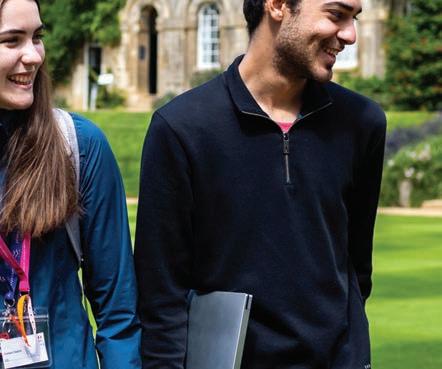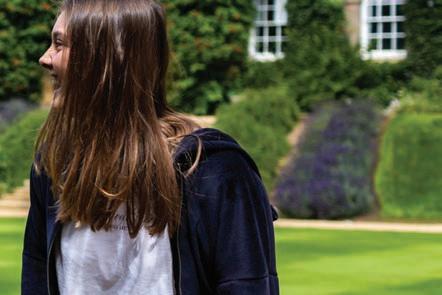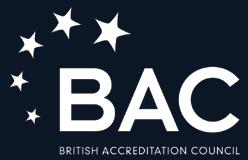Nature INDEPENDENT SCHOOL PARENT






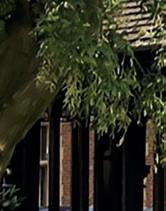


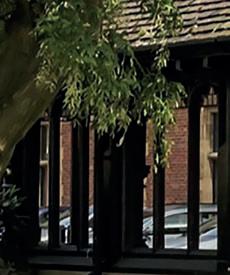
NEW SCHOOL TOOLS How your child is using AI
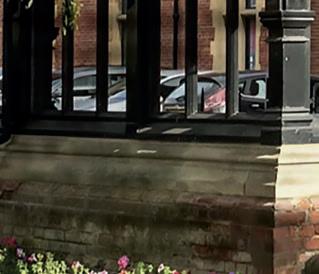
GCSE S Is it time to ditch them?
WIN a weekend’s stay in the Highlands

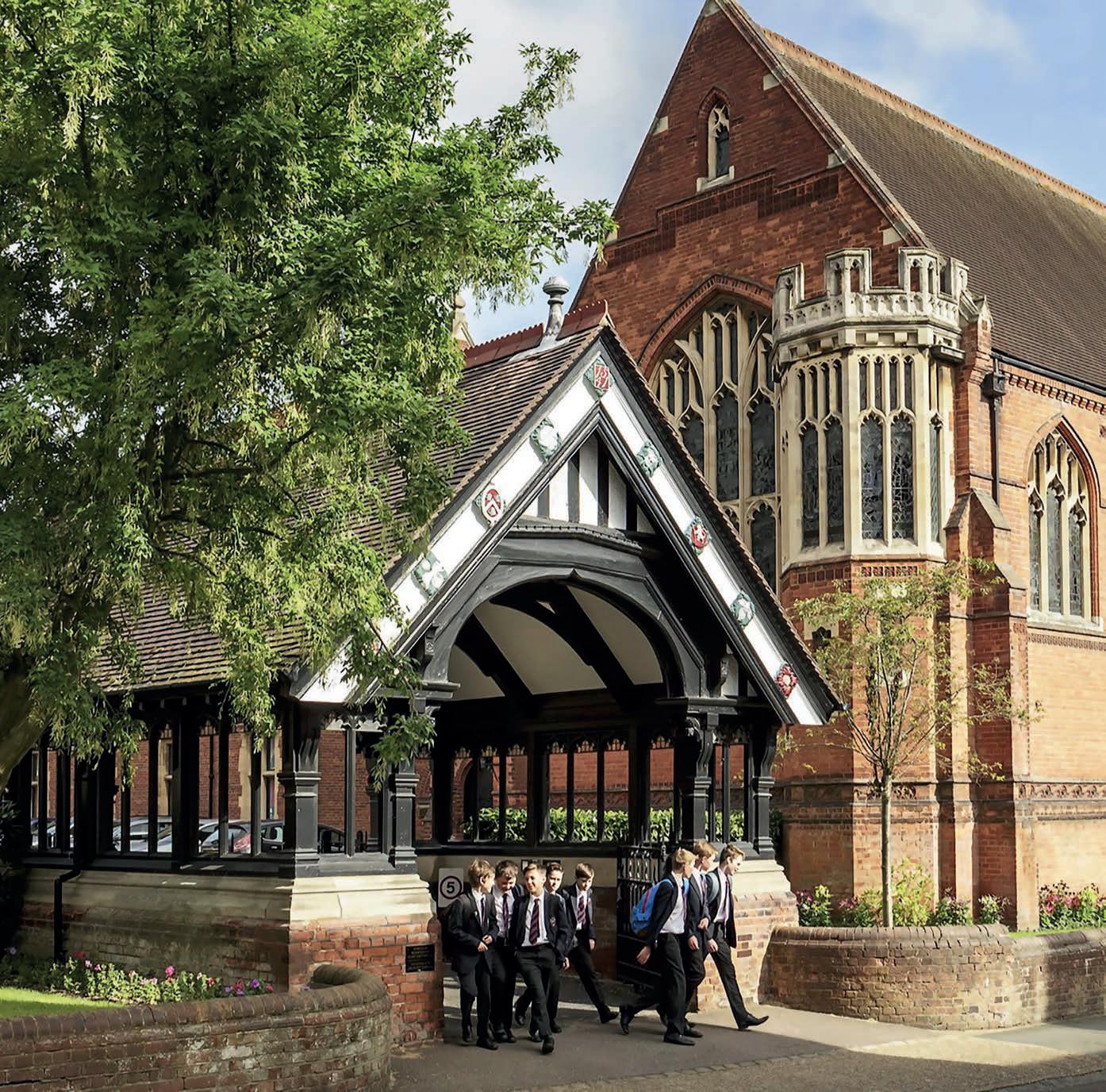
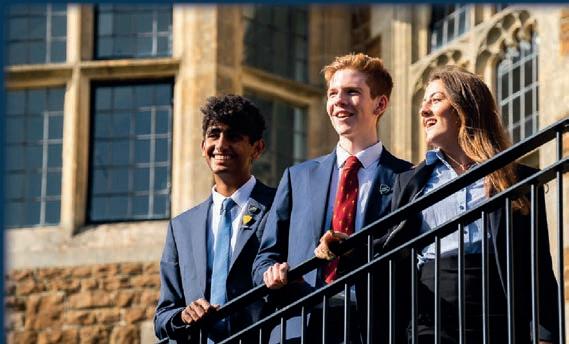














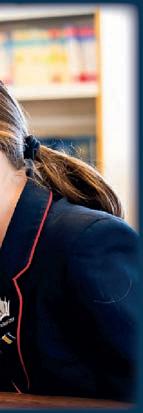


















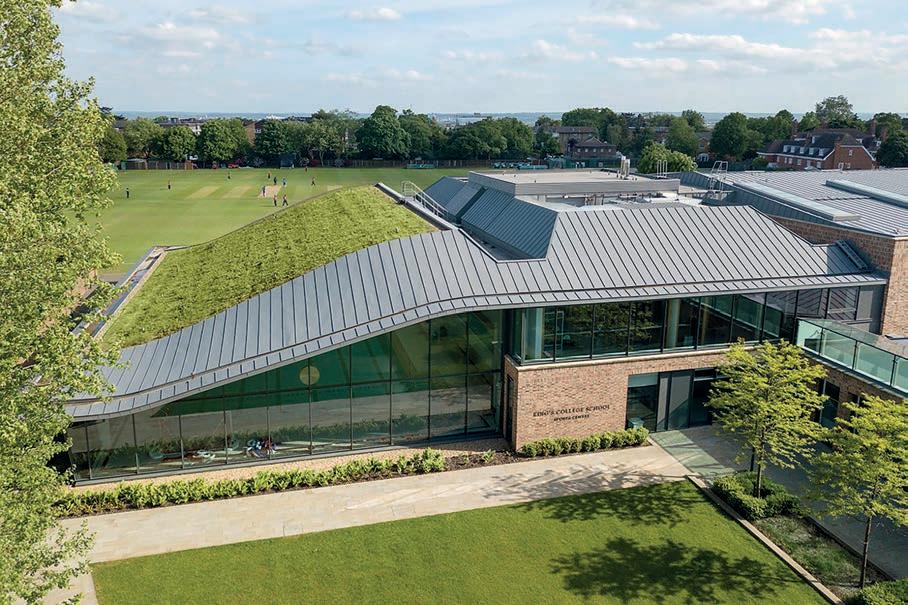

It’s my pleasure to welcome you to the autumn senior schools edition of Independent School Parent.
Just before half term we held our awards ceremony for the Independent Schools of the Year 2024 awards campaign – which is now in its seventh year – with attendees from across the sector converging on the Law Society in central London to find out who had clinched the top spot in each of the 24 categories. Head over to the website, independentschoolsoftheyear.co.uk for a list of the winners and commended schools. Here, we feature King’s College School Wimbledon, which was one of the finalists in the Outstanding Educational Partnerships category. Turn to page 45, where you can learn all about its impressive community-enriching provisions. Many thanks to those of you who entered.
After a hugely exciting summer of sport culminating in the 2024 Paris Olympics, Headmaster of Malvern College, Keith Metcalfe writes about how sport can create immensely positive energy among young people, regardless of background and nationality (page 32). And financial status is by no means a barrier to developing pupils’ success either. Year nine student Melino Fakahau, 14, who excels at rugby tells us how his bursary is inspiring him to reach his goals. There’s also a competition for a lucky family of four to enjoy a weekend away in the gloriously wild surrounds of the Scottish county of Perthshire. Head to page 73 for all the details on how to enter.
Happy reading!
CLAUDIA DUDMAN, EDITOR
6 In brief
All the latest senior school news
11 Get prepared
13
14
22
How classroom coaching builds resilience
The next step
A bespoke mentoring programme is helping sixth formers prepare for their future
Space to thrive
Rural schools are making the most of their outdoor space for curriculum enrichment
The GCSE revolution
How some independent schools are taking year-11 qualifications into their own hands
28 Finding a balance
Why Haileybury is harnessing AI platforms to benefit both its teachers and students
32 Sporting chance
A look at how scholarships and bursaries can shape the next generation of athletes
40 Ask the experts
How are schools monitoring pupils’ mobile phone use?
45 Let’s come together
ISOTY finalist King’s College Wimbledon shares insight into its partnership programme
48 Behind the scenes
Pangbourne College, Berkshire
50 Prepare to launch
Two sixth-form colleges share how they add value to this stage’s typical academic o ering
55
Hello, world
From art-history gap years to superyachting degrees, a spotlight on post-school options
60 Movers and makers
Independent-school alumni share their varied career paths and vocational successes
64 Golden opportunity
Tracey Davies shares her family’s adventurefilled autumn break in the New Forest
68 Calendar
Autumn fun for the whole family
73 Competition
Win a Highland stay for a family of four
74 My school days


West End stage star Callum Henderson looks back fondly at his time at Hurtwood House
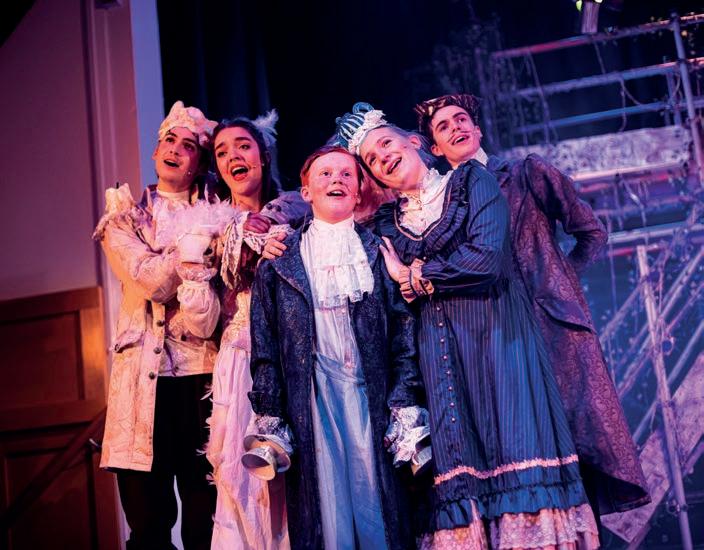
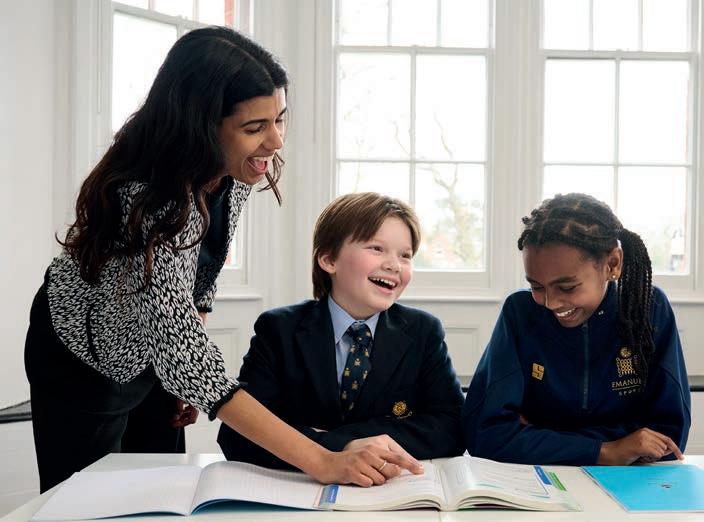


2
EDITORIAL Editor
ADVERTISING
Group Sales Director Catherine Chapman catherine.chapman@chelseamagazines.com
Head of Sales Operations Greg Witham greg.witham@chelseamagazines.com
Portfolio Manager Nicholas Gavigan nicholas.gavigan@chelseamagazines.com
Advertisement Manager Harriet Cottrell Harriet.Cottrell@chelseamagazines.com
Advertisement Manager Andrew Mackenzie andrew.mackenzie@chelseamagazines.com
COLIN BELL
is CEO of COBIS, which works with and supports students, teachers, leaders, support sta and governors from highquality British international schools in more than 80 countries around the world.
ALISON FLEMING has been Headmistress at Newton Prep in Battersea since September 2013. Educated at grammar school herself, she started out her impressive teaching career honing her classroom craft in state schools.
AILEEN KANE is the Boarding Schools’ Association’s Chief Operating O cer, overseeing media, marketing, sponsorship, finance and HR facilities. Aileen is a member of BSA’s senior leadership team.

and

without permission from the publisher. The information contained in Independent School Parent has been published in good faith and every effort has been made to ensure its accuracy. All liability for loss, negligence or damage caused by reliance on the information contained within this publication is hereby excluded.
EDITORIAL ADVISORY BOARD
Colin Bell, COBIS
Alison Fleming Newton Prep, Battersea
Aileen Kane, Boarding Schools’ Association
Rachel Kerr, AMCIS
David Moncrie , Chairman
Sir Anthony Seldon, Founding Director, Wellington College Education
Mark Stretton, HMC
Ben Vessey, Canford School, Dorset
Sue Woodroofe, The Grammar School at Leeds
Helen Wright, Educational consultant
RACHEL KERR is Communications Manager for AMCIS, the association for Admissions, Marketing and Communications in Independent Schools. Previously, she led communications for the
Girls’ Schools Association and has been director of external relations for a large independent school.
DAVID MONCRIEFF is a publisher specialising in education and heritage, having previously worked as Director of Marketing at Mayfield School, and for more than 12 years as Director of Marketing Services at the British Tourist Authority.
SIR ANTHONY SELDON is a contemporary historian and political author. He’s the Emeritus Professor of the University of Buckingham and was the 13th Master of Wellington College in Berkshire from 2006 to 2015. He was the 15th Head at Epsom College, Surrey and is now Founding Director of Wellington College Education.
MARK STRETTON joined the Headmasters’ and Headmistresses’ Conference (HMC) as Communications Manager in 2017, bringing with him more than 15 years’ experience in education sector communications.
BEN VESSEY joined Canford in 2013 as Headmaster from Christ’s Hospital, where he was Senior Deputy Head. He’s currently Vice-Chair of the HMC’s Professional Development sub-committee.
SUE WOODROOFE has been a Head for 12 years, first at The British School of Brussels, and now at The Grammar School at Leeds. She has a particular interest in the three-to-18-years educational journey, as well as the benefits of multicultural and international learning environments for children.
DR HELEN WRIGHT is a former President of the Girls’ Schools Association and Vice-Chair of ISC, with three major headships under her belt. Since 2014, she has worked in international education and advises, recruits and coaches senior leaders in independent schools all over the world.



















STUDENT SUCCESSES
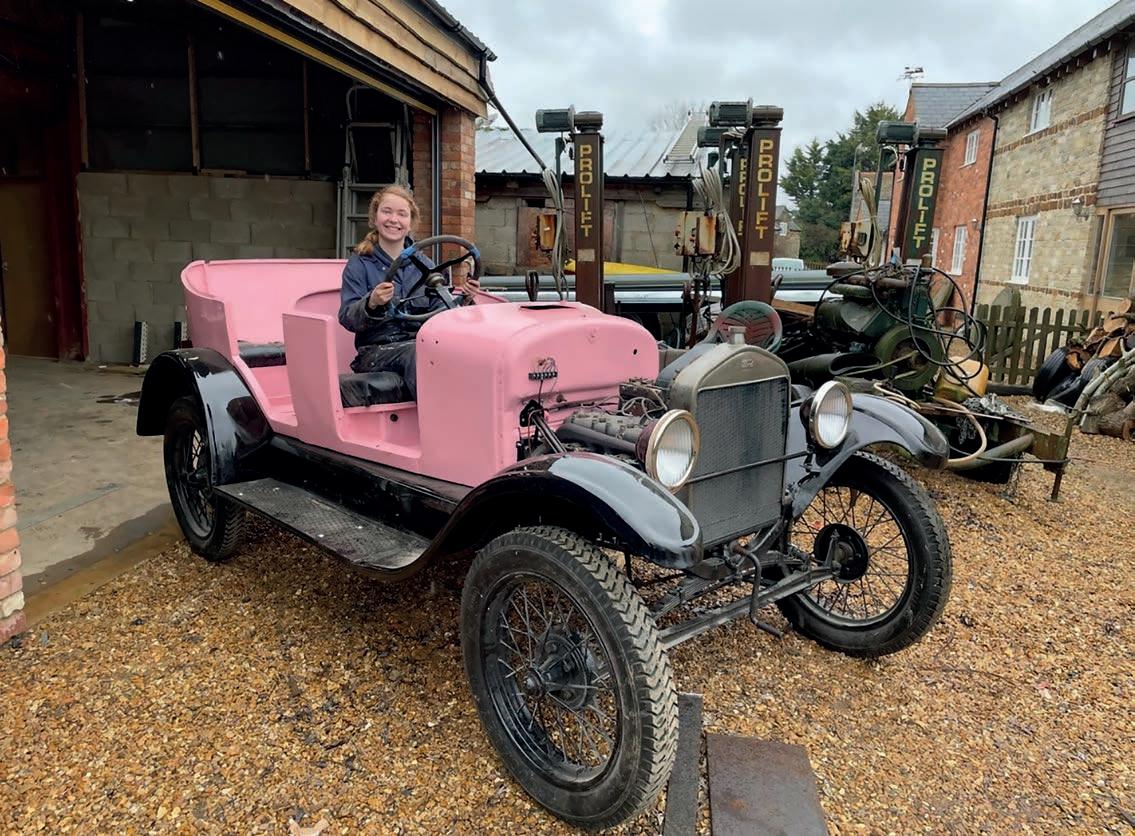




Sixth former Rosie Hodgson-Jones has been named the winner of the prestigious National Transport Trust’s Young Preservationist of the Year Award 2024. The esteemed accolade, which recognises the achievements of young people in vehicle restoration, was presented by Her Royal Highness Princess Anne, patron of the Trust, during a special ceremony held on 17 September at Fawley Hill, Henley, the home of Lady Judy McAlpine.
Rosie’s remarkable achievement follows her restoration of a 1926 Ford Model T, a project she began after purchasing the car body at the Ford Model T Club of Great Britain’s annual auto jumble
sale. Over the past three years, she has painstakingly rebuilt the vehicle, starting with a rusty old engine and gearbox sourced by her grandfather. She has learned how to restore each component of the historic car, developing skills in mechanics and automotive preservation.
Her e orts culminated in the presentation of the Young Preservationist award, alongside a £500 cheque to further support her project. Rosie plans to use the funds to help complete the restoration, with the main task being the upholstery of the car.
After completing her A-level studies, she plans to secure an engineering degree apprenticeship, with the ultimate goal of becoming an engineer.
• FRONT
Millfield School, Somerset
A high-ranking army officer has been appointed as the school’s first female Director of Sport. Brigadier Irena Dzisiewska – also a keen horsewoman, rugby player and Ironman triathlete – will leave the forces at the end of 2024 to take up the role.
• CROWNING
Terra Nova School, Cheshire
Aaron Cao, a former year eight pupil, has started his first term at Eton College as a King’s Scholar. He’s one of only 14 boys out of more than 100 applicants to be selected for this prestigious scholarship prize.
• SETTING THE STAGE
Bryanston, Dorset
An Art Advisory Board of distinguished Old Bryanstonians, including actress Emilia Fox and conductor Mark Wigglesworth, has been formed to share knowledge and experience with pupils seeking creative careers.
• ACE OF CLUBS
Ewell Castle School, Surrey
The school’s tennis academy welcomed the Lawn Tennis Association’s President Sandi Proctor to open its new floodlit clay courts. Now in its tenth year, the Director of Coaching, Tom Burn and Tennis Surrey have played a role in its success.
• THE RIGHT PATH
Bede’s Schools, West Sussex
The whole school has been named a STEER Champion School, a prestigious recognition for applying the STEER programme which tracks pupils’ social and emotional development.
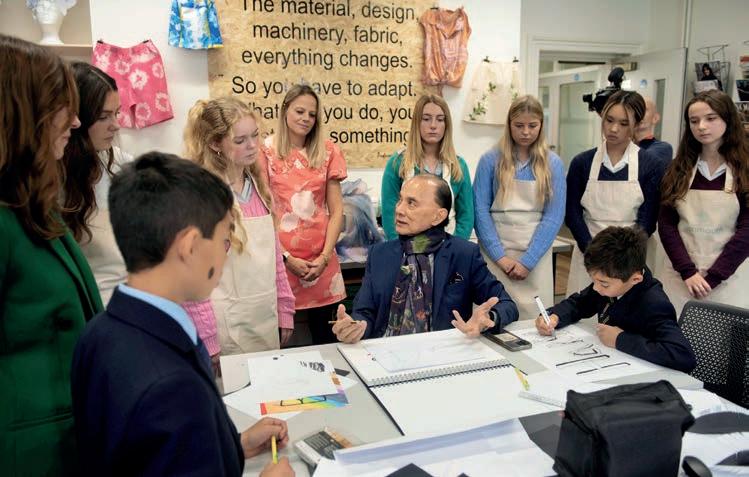
Haberdashers’ Monmouth, Monmouthshire
During its first open day as a co-ed school, one of the many highlights was the presence of world-renowned fashion designer Professor Jimmy Choo, who guided students through the creation of original catwalk-worthy headpieces. Recently appointed as the school’s Patron of Fashion, Design and Textiles, Choo’s forthcoming exclusive workshops and dedicated mentorships will mark an exciting new chapter for Haberdashers’ Monmouth.

St Margaret’s School for Girls, Aberdeen
Marking the end of the allthrough school’s Culture Week, the fashion show celebrated international dress. Students from every year group took part in activities throughout the week to celebrate the diversity of cultures within the community, which has students of 33 different nationalities in the senior school alone.
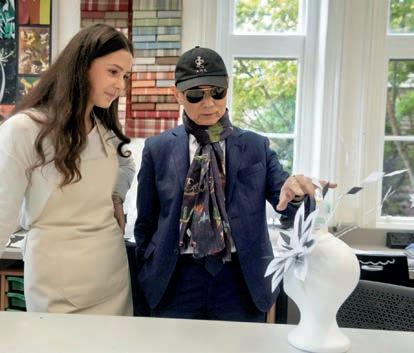
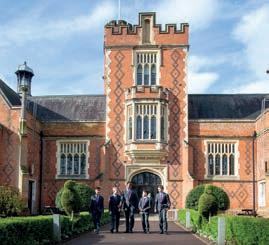
The Loughborough Schools Foundation, Leicestershire
A generous gift of £2.2m has been left to prospective pupils of both Loughborough Grammar School and Loughborough High School in the will of Loughborough Grammar alumnus Derek Greasley (class of 1956). Derek left the life-changing donation to fund ‘Greasley Bursaries’ for pupils from the Charnwood District.
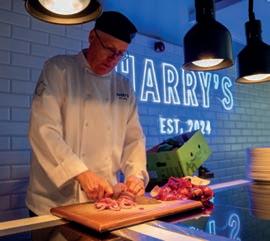
Strathallan, Perthshire
New dining facility Harry’s – named after the school’s founder, Harry Riles – aims to create a fresh on-campus canteen environment, with menus that cater to diverse palates and dietary requirements. Made possible through a partnership with catering providers Independents by Sodexo, it’s set to bring the community together in a vibrant way.
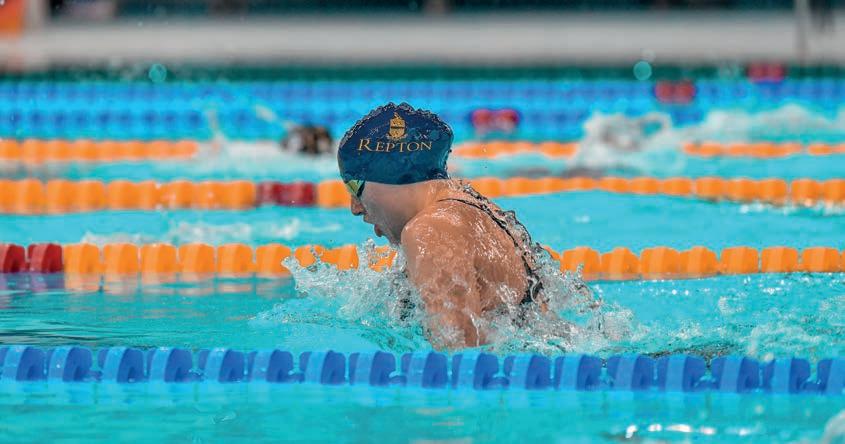
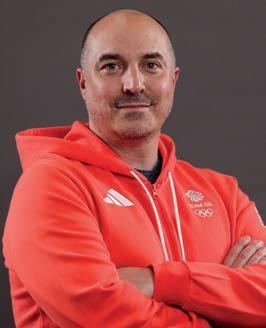

Sixth former Charlotte Brookes was selected to take part in the England Rugby Player Development Group (PDG) and the England U18 Rugby Camp during half term. The camp’s aim is to provide a development experience that supports high-potential players start their adult rugby journey. She has been involved in lots of sports during her senior-school career, including hockey and cricket to a high level, as well as working with the 1st XV rugby team.
Repton, Derbyshire Repton School has announced the appointment of Jamie Main as Director of Swimming, starting January 2025. He’ll join Repton from his position as the National Coach at The Aquatics GB Bath National Performance Centre, having recently coached senior international teams and athletes at the 2024 Olympic Games in Paris, the 2023 World Aquatic Championships in Japan, and the 2022 Commonwealth Games in Birmingham.
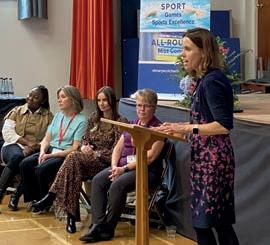
St Mary’s, Essex
Students were joined by a panel of inspiring female leaders during its Empowering Girls Leadership event this term. CEO of award-winning law firm Fisher Jones Greenwood, Paula Fowler, kicked off the talks by sharing her career trajectory. Trainee Detective Constable Evie Thatcher, Little City UK founder Vicki Fletcher, and business expert Bolaji Sofoluwe followed, each sharing their experiences as women within their industries.

Heathfield School, Berkshire
Marking 125 years, the girls’ school continued its legacy of nurturing fashion talent –including entrepreneur Tamara Mellon and stylist Charlotte Stockdale – with a pioneering AI fashion workshop hosted by Raya Khalifeh, textile designer and founder of fashion-tech platform, Craftnology. It covered the use of prompts, an introduction to AI tools, and collaborative design. The class’ innovative outcomes will support pupils’ practical portfolios.
Highgate School, North London
As a team, sixth form pupils Felix, Cosmo, Rosa and Joshua achieved a perfect score to win the Physics Unlimited Explorer competition – a global contest with senior-school teams solving undergradlevel physics problems.
Wellington College Prep, Berks In September, Eagle House Prep officially changed its name to Wellington College Prep to reflect its relationship with Wellington College, with shared values, such as curriculum development, sports facilities and teaching.
• SILVER
Rydal Penrhos School, Wales
The all-through school has been awarded the coveted Armed Forces Employer Recognition Scheme (ERS) Silver Award, another positive milestone as it continues striving to support service families and veterans across the region.
• WELL
Queen Anne’s Caversham, Berks Poet and mathematician, Harry Baker joined in National Poetry Day, continuing the tradition of inviting prominent poets, such as John Agard, MaryJean Chan, Dame Carol Ann Duffy and Simon Armitage.
• FAITH
Prior Park College, Somerset
The school has announced a change in designation from Catholic to Christian. The move ends a relationship with the Catholic Church dating back to 1830 and will allow it to expand the range of opportunities offered.
Headteachers on the move






In September 2025, Dr Clare Ives will become Head of The Leys School in Cambridge.
Wellington College Education, international
Cheadle Hulme, Greater Manchester has welcomed Lee Richardson as its new Head.
Sir Anthony Seldon has been appointed Founding Director of the college’s new global education network, Wellington College Education (WCE). Currently encompassing 10 schools around the world, its activities include Festivals of Education in the UK, US, China and Thailand. Sir Anthony is charged with developing the network in the UK and abroad, infusing it with a unified vision of what responsible and imaginative education means in the 21st century.
Matthew Judd will take up the role of Head of West Sussex’s Christ’s Hospital in September 2025.
Dr Scott Crawford will take over as Head of Lancing College, West Sussex from September 2025.
Queen Margaret’s School for Girls, York welcomed new Head Nicola Dudley this autumn.
Chris Seal will take over as Head of Stamford School, in Lincolnshire in September 2025.
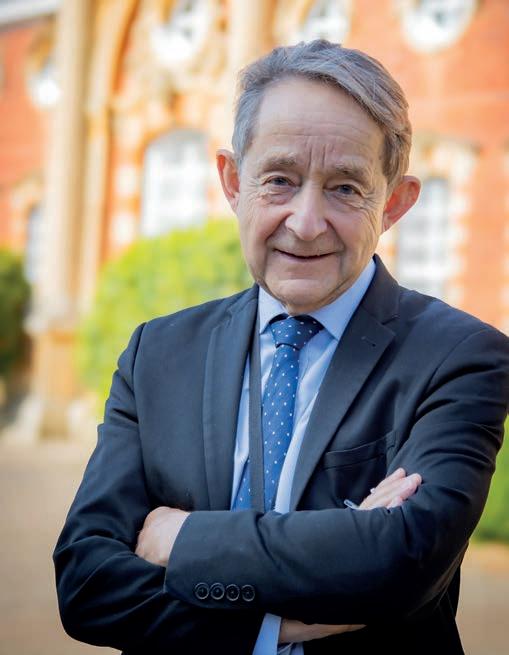

Bradford Grammar School, West Yorkshire
Sixth former and aspiring actress Georgina Madeley performed on the national stage this summer after securing coveted places with two of Britain’s most prestigious youth theatre companies.
The 17-year-old student was selected to join both the National Youth Theatre and the British Youth Music Theatre (with a role in Welcome to Serene) following two gruelling auditions.
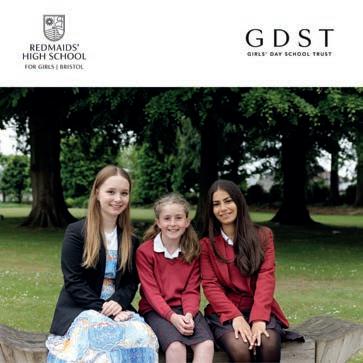
The girls’ school will be joining the Girls’ Day School Trust (GDST), from 1 February 2025. Having been found to embody the ethos and values of the trust, the girls’ school’s staff and students will be able to embrace opportunities to collaborate, share best practice and learn from its sister schools across the country. This will further amplify the benefits of its forwardlooking education.

One of the most VISIT
One of the most VISIT
One of the most VISIT
One of the most VISIT
The Good Schools Guide exciting schools in Britain.”

The Good Schools Guide exciting schools in Britain.”


Register for our Open Evening on Thursday 28 November, 5pm to hear from staff, students and to explore our state-ofthe-art facilities on London’s Southbank.
Register for our Open Evening on Thursday 28 November, 5pm to hear from staff, students and to explore our state-ofthe-art facilities on London’s Southbank.

-P
Register for our Open Evening on Thursday 28 November, 5pm to hear from staff, students and to explore our state-ofthe-art facilities on London’s Southbank.
DLD is a hidden gem.”
DLD is a hidden gem.”

DLD is a hidden gem.”
-Parent

-Parent













Register for our Open Evening on Thursday 28 November, 5pm to hear from staff, students and to explore our state-ofthe-art facilities on London’s Southbank.
DLD is a hidden gem.”








DLD
The Good Schools Guide exciting schools in Britain.” DLD
The Good Schools Guide exciting schools in Britain.” DLD






















DLD College London’s new Principal James Kidd advocates for coaching in the classroom to build resilience for the future
Blending traditional subjects with forward-thinking approaches to learning ensures that our students consistently achieve the grades needed for their desired next steps, while building the character and resilience required to handle what those steps demand of them. All of this is accomplished in a nurturing environment that instils the confidence for them to take their place as wellrounded, successful individuals.
As I write, this week sees the start of my second month as Principal at DLD College London, affectionately known as DLD – for the previous four years, I held the role of Senior Vice Principal. In my opening assembly to our students, I talked about wanting them to focus
Moreover, coaching in the classroom fosters a collaborative learning environment. Students are encouraged to work together, share ideas, and learn from each other’s perspectives, which not only enhances academic success but also builds essential social and interpersonal skills. This collaborative approach helps students understand that learning isn’t a solitary journey; it’s something which is enriched by diverse viewpoints and shared experiences. Through this, they also develop empathy, teamwork, and communication skills, which are crucial for personal and professional development in the real world.
Ultimately, the coaching approach equips students with the tools they need for lifelong learning. It nurtures resilience, adaptability,

TEACHERS STILL SCAFFOLD AND GUIDE, BUT COACHING TAKES children out of their comfort zone and to a place where they question and CONSIDER, RATHER THAN MERELY FOCUS ON THE RIGHT ANSWER
on qualifications and character; preparing them now to be successful 25 year olds in the future, with the academic grades to be able to make choices as to where they go next, alongside the resilience and fortitude to tackle whatever an ever-changing life throws at them.
I’m a big advocate of coaching, having used it heavily while a pastoral deputy. However, I’m seeing more and more ways that it can be successfully used in the classroom … (it’s the subject of my ongoing doctorate!). For far too long, I believe we’ve spoon-fed children factory-style and taken away their agency, and then wondered why they didn’t have the skills and resilience to cope with the issues they faced at university or in the workplace.
Coaching in the classroom turns that on its head, leading the students to see how they can approach a problem differently and how they have the answer to that problem already. Teachers still scaffold and guide, but – linking back to my belief that we need to consider where students will be in 10 years – coaching takes them out of their comfort zone and to a place where they question and consider, rather than merely focus on the right answer.
and self-confidence – traits that will serve them well as they navigate the complexities of future challenges, whether in further education or the workforce. Coaching in the classroom isn’t just about academic success; it’s about preparing students to thrive in an ever-changing world, where the ability to learn, unlearn, and relearn will be key to their growth and success.
In my time at DLD College, students have consistently proven their ability to succeed following their time with us, with many students going on to study at Oxbridge, Russell Group institutions, leading international universities and on to pursue their carefully chosen career paths. I’m very much looking forward to building on this success with the team here at the college, delivering an excellent education that meets the needs of a 21st century student in an ever-changing modern world.
DLD College London is a co-ed independent day and boarding school set in the heart of London, for students aged 13+. The college’s next open evening will take place on Thursday 28 November from 5pm. dldcollege.co.uk


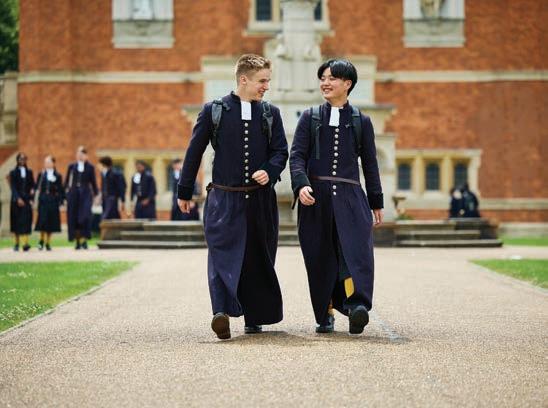










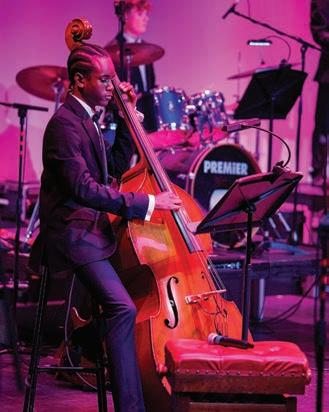

Sixth
formers take part in a bespoke mentoring programme at Heathfield that prepares them for life beyond school, says Richard Willis
At Heathfield, we pride ourselves on providing a student-centred approach, which positively encourages and supports each individual to pursue and develop their unique passions, interests and abilities. Our intentionally small student population, offers the greatest gift in education – time, and with a staff-student ratio of 1:4, we can dedicate a huge amount of time to every individual.
Sixth form heralds big changes for all students. Moving from the more structured school experience necessary for younger students, to one with greater independence and responsibility. At Heathfield, this not only means they move to our state-of-the-art sixth form centre, but also that our approaches to supporting these
success in maths. Conversations can be revisited to continue guidance and records are assiduously followed up. Some students move to the next phase of the programme immediately, while others receive further guidance on core academic skills for an extended period of time.
Other key aspects we cover through mentoring, are standard sixth form requirements: revision and research methods, discussion of future plans, and interview practice. There are some natural events in the sixth-form cycle that dictate discussions at certain times, but mentoring can pivot and potentially revisit past topics, depending on what would be most beneficial to the individual.
All our sixth formers are treated as young adults, capable of phenomenal outcomes in all

WHAT DO WE WANT OUR STUDENTS TO BE WHEN THEY LEAVE sixth form? The answer was, of course, students who are passionate, SELFLESS, INDEPENDENT, CONFIDENT AND READY TO SUCCEED
emerging young adults reflects these expectations. We’ve developed a carefully crafted mentoring programme, which all our students recognise as adding value to their sixth form experience.
The mentoring platform enables students to develop the attributes essential for their next steps. Unlike the traditional taught model, mainly based on knowledge, mentoring holds that individual relationship at its core, and throughout the sixth form experience, has the flexibility that allows us to focus on different priorities.
When we designed the mentoring programme, we began with one guiding question: what do we want our students to be when they leave sixth form? The answer was, of course, students who are passionate, selfless, independent, confident and ready to succeed. Initially, the programme focuses on developing the work habits required for A-level success – reviewing work, note-taking and utilising study periods. Some students require assistance and support adapting to being independent and taking the initiative at A-level, while others embrace it.
Mentoring is not only a more personal approach, it allows us to cater to each A-level course – success in history looks different to
areas of school life and beyond, but mentoring ensures that they have that extra guidance we all need sometimes. They enjoy being heard, and getting the recognition and support they need to develop the attributes required for success in their next steps.
Our students have welcomed this new approach. Comments from the sixth form regarding their mentors, demonstrate the effective mentoring relationships fostered by their teachers, and its success – “He just knows us”, and “It was essential for me to adapt to my A-levels”.
Mentoring takes time, energy, and significant expertise from the mentors, but it reaps amazing results. Students are supported as they move from the more regimented structure of GCSE, to more self-directed study and choice at A-level. A critical point in their school career, which involves a shift in mind-set, crucial for them to then go on to achieve and become their best possible selves.
We believe mentoring adds to the positive, holistic sixth-form experience here at Heathfield, and continues to build those interpersonal skills, such as, communication, collaboration and creativity, that are pre-requisites for university life and the world of work today.
From lessons and sport to extracurricular fun, Katie Hughes looks at how rural schools are making the most of their abundant grounds to get students to abandon their screens for the great outdoors
Recent research¹ shows that independent schools give pupils, on average, access to 10 times more outdoor space than their state-educated peers. So, how are schools using this green space and why is it so important?
Evidence from environmental psychologists shows that green space can reduce stress, improve mood, and enhance cognitive function for children –boosting attention span, problem-solving abilities and academic performance. And independent senior schools are welltuned into these findings.
Schools aren’t just ensuring that pupils have plenty of exposure to green space, they’re also providing a huge range of outdoor learning opportunities, with farreaching benefits.
Space for sport
At Millfield School in Somerset, pupils can take their pick from 11 full-size football pitches, numerous cricket squares, a 400m athletics track, an outdoor equestrian arena and much more. And having space for facilities like these doesn’t just encourage students of all sporting abilities and inclinations, it also provides green views at every turn.
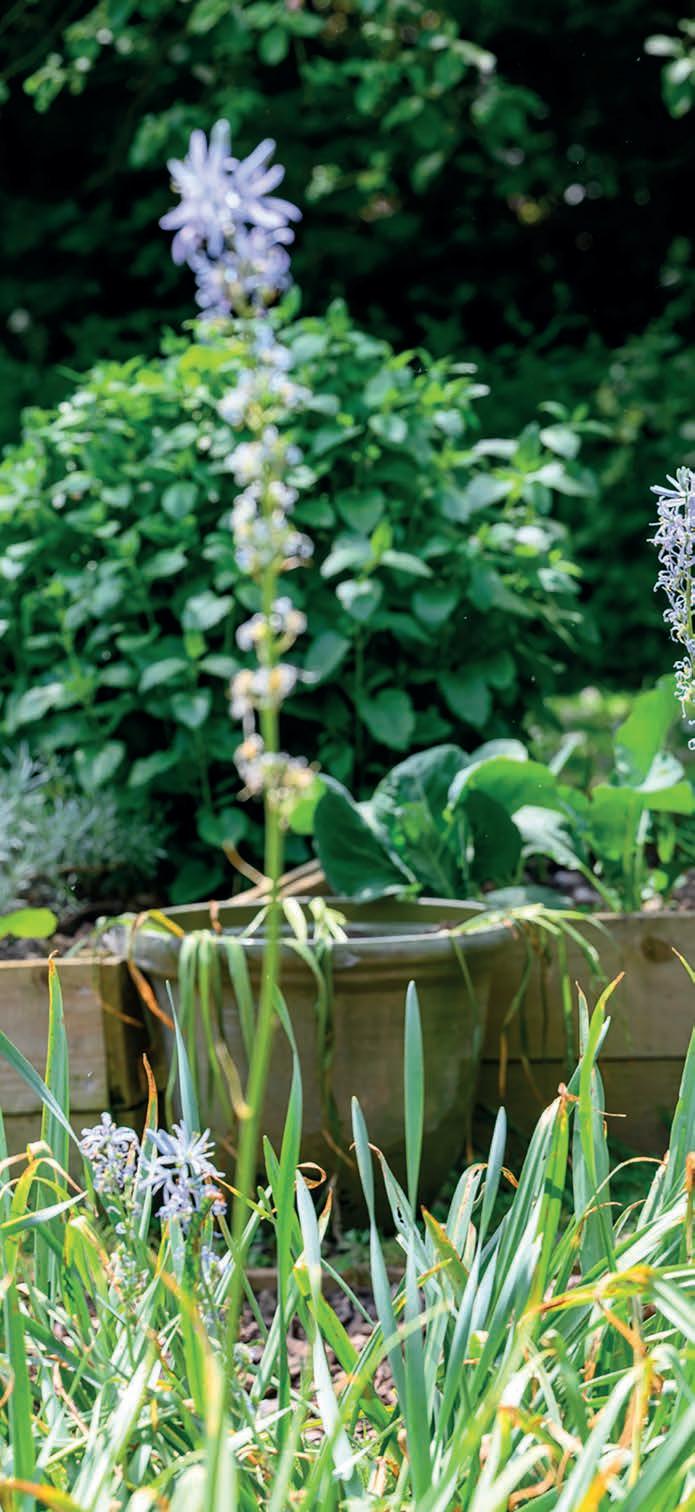




HAILEYBURY DRAWS ON ITS 500-ACRE grounds to teach the benefits of biodiversity. Initiatives include planting 700 trees and SOWING WILDFLOWERS TO BOOST INSECT HABITATS

Similarly expansive are the grounds at Glenalmond College in Perth, which, like Millfield, incorporates a nine-hole golf course. “We provide a development pathway for all standards of golfer, from beginners through to the most talented,” the school tells prospective parents. And many a professional player has been born as a result.
Sporting opportunities created by outdoor space are ubiquitous across the independent sector. In Su olk, for instance, the Royal Hospital School has sports pitches spanning 96 acres, and a cross-country running course for county

competitions. In Dorset, Milton Abbey School gives horse-riding pupils a grass show-jumping arena and o -road hacks right from the door. And at Shrewsbury, rowing crews launch boats from banks in the school grounds, to train on a meandering seven-kilometre stretch of the River Severn.
Green space at independent schools is also giving pupils a chance to contribute to the natural world.
Take Haileybury in Hertfordshire, which draws on its 500-acre grounds to teach the benefits of biodiversity. Initiatives include planting 700 trees, sowing wildflowers to boost insect habitats and leaving large swathes of grass unmown. These have earned Haileybury EcoSchools Green Flag and Woodland Trust Green Tree School Awards.
Going north, to Glenalmond, a pupil eco group meets weekly to help develop the school’s natural environment. Recently it has recycled old planks, pipes and guttering to create an eco garden (complete with bug hotels) and provided havens for wildlife like red squirrels and birds. Next on its wish list? Sustainable honey production from the school’s new colonies of bees.
Meanwhile, at Felsted in Essex, new Head of Sustainability Nia Thompson is
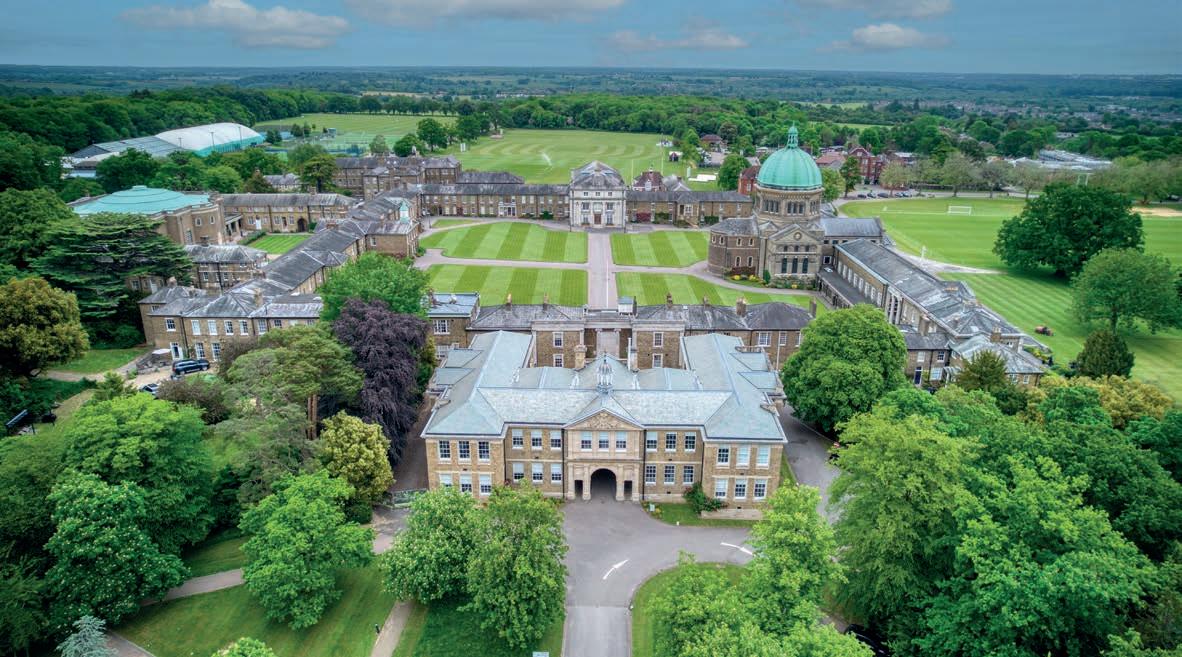
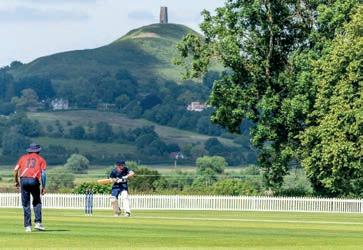

on a mission to rewild areas of the school grounds and encourage new species of flora and fauna. And a keen pupil body of ‘sustainability reps’ supports her.
Learning beyond the classroom’s four walls is prized by senior pupils and schools alike, and it often involves adventure too.
At Glenalmond, there’s an outdoor learning programme that covers everything from conservation to mountain biking (on a newly installed trail) and climbing Munros. Its aim is to engage pupils with the world around them, encouraging curiosity, problemsolving and critical thinking.
Windermere School, at the edge of England’s largest lake in the Lake District, takes the curriculum outdoors and into its local Unesco-listed environment. Here, as Head Frank Thompson explains, “English
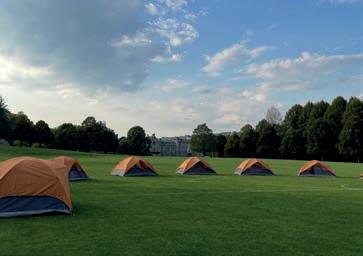
might involve a poetry lesson under the old oak trees and the outdoor classroom is in daily use (the science explosions can be bigger!).”
Thompson says, “Allowing our senior school pupils to study outside enables them to physically grasp complex curriculums while gaining mental health and physical wellbeing benefits.”
Windermere pupils can also take an NCFE (National Council for Further Education qualification) in outdoor adventure, involving sailing and caving. And at Haileybury, an Adventure Skills programme includes mountain biking, canoeing, camp-craft and more.
Plenty of outdoor space for alfresco entertainment
Over at Downe House School, pupils and their families spread out across the lawns, play garden games in the cloisters and are entertained by sporting, musical
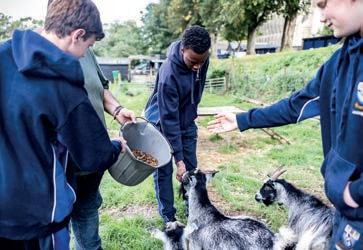




Lancing College in Sussex has plenty of space for its very own 320-acre working farm; part of which is home to a flock of Shetland cross sheep, pigs, goats and a poultry unit. There’s also a donkey, working pony and small animal unit.
For students studying (or interested in) the environment, sustainability and life sciences, the farm provides the perfect practical classroom. It gives pupils the chance to have hands-on experience with animals and to learn about the ins and outs of crop rotation, hay and silage production and a whole raft of conservation schemes.




Co-educational 11-18 day school with flexi and weekly boarding


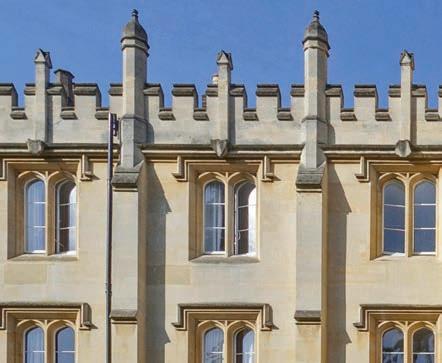



Help lead and shape our innovative and ground-breaking education

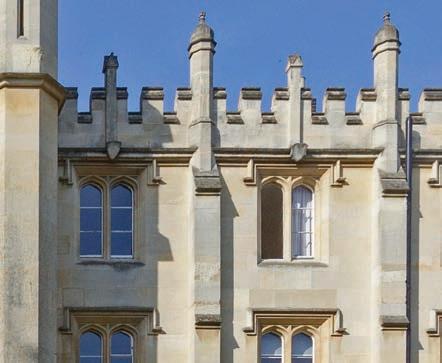
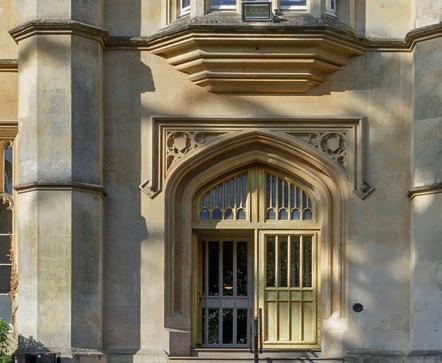


thomas-s.co.uk/thomass-college

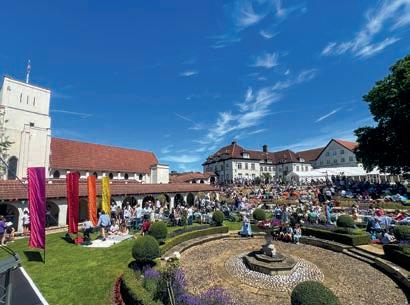
and artistic displays – both live and on a big screen. This is all part of the school’s annual Founder’s Weekend, set in its expansive 110-acre estate near Newbury.
Wycombe Abbey in Buckinghamshire has a similarly spectacular setting in which to host alfresco events; among them outdoor cinema screenings set against its beautiful buildings. These see pupils getting cosy with blankets, popcorn and ice cream, and following up films with a camp out in the spacious school grounds.
In nearby Berkshire, a Greek amphitheatre sits in a secluded corner of the grounds at Bradfield College, under a canopy of trees. Described by architectural journalists as “wild and intoxicating”, the theatre has drawn 1,000-strong audiences to watch pupils perform since the late 19th century.
“The experience of performing in that special space has stayed with me and always will,” says actor and former pupil Claudia Harrison.
Downe House describes its environment as “tranquil”, Windermere says its surroundings are “idyllic” and Haileybury talks of its “beautiful countryside” setting.
Like others in the independent sector, these schools don’t just set aside their green spaces for formal or organised events. Windermere School’s Frank Thompson explains, “We allow pupils to escape the everyday pressures and walk, run, play, learn or simply be, within our glorious surroundings.”
Mountain-biking trails are part of Glenalmond’s outdoor learning programme
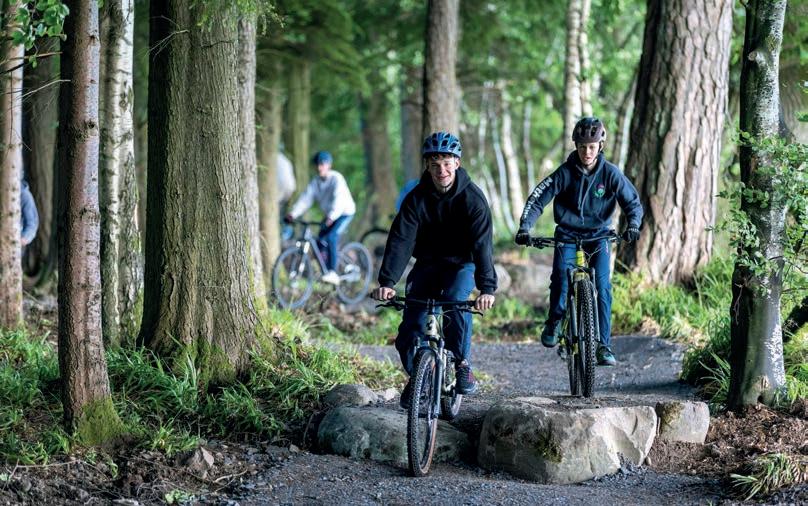
DOWNE HOUSE DESCRIBES ITS environment as “tranquil”, Windermere’s surroundings are “idyllic” and Haileybury TALKS OF ITS “BEAUTIFUL COUNTRYSIDE” SETTING

The same sentiment sits behind the creation of a wellbeing garden at Lingfield College in Surrey, where bees buzz and the school community can hang out quietly or get active with the gardening club.
With a recent government report showing that almost a quarter of children and young people are addicted to their smartphones2, it’s never been more important to focus on the great outdoors. With their lawns and lakes, pitches and paddocks and riverbanks and rolling countryside, independent schools may have the solution.
• More than 50 per cent of children and young people say they feel highly connected to nature
• 88 per cent say that being in nature makes them very happy
• 84 per cent say that looking after the environment is important to them
Source: The Children’s People and Nature Survey for England 2023

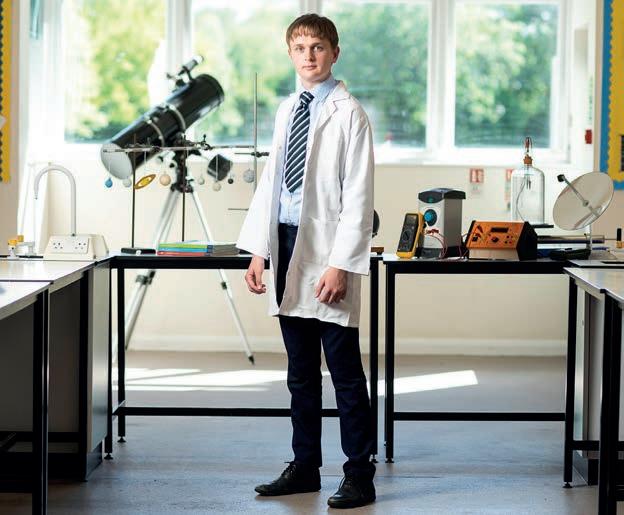
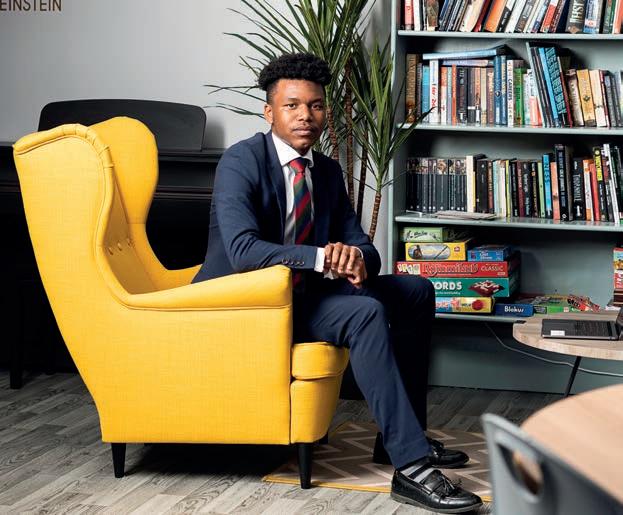
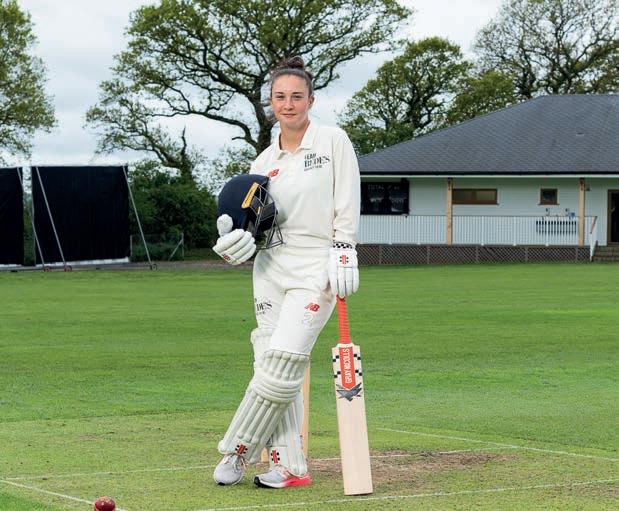

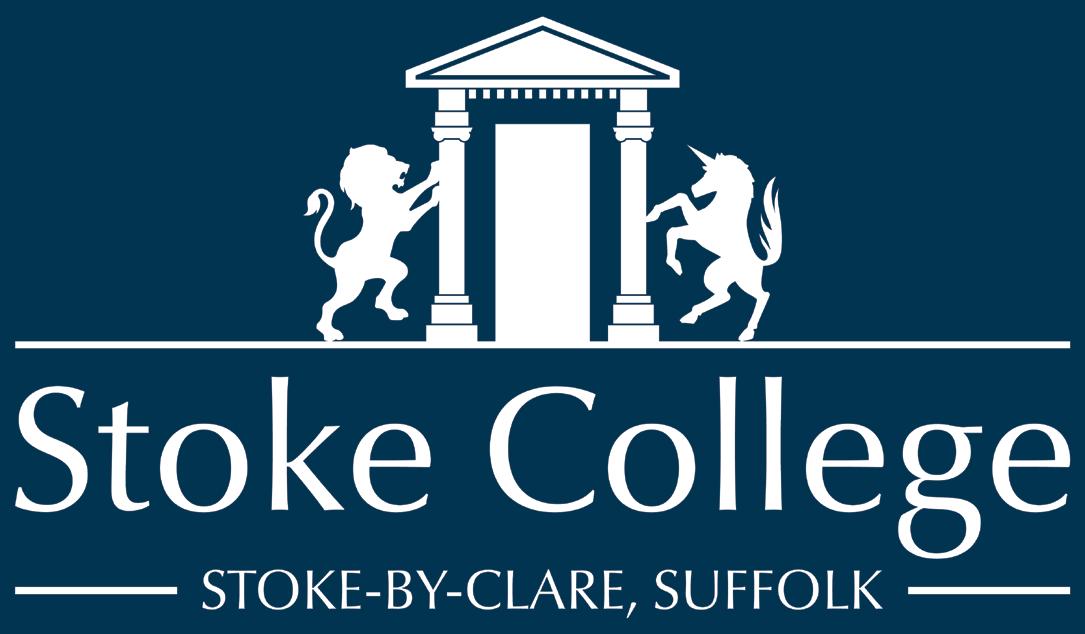


Elizabeth Ivens looks at how an array of nationally acclaimed schools are taking the year-11 qualification into their own hands with new testing systems
Calls for GCSEs to be reformed or replaced have been growing for well over a decade, reaching a crescendo when the school leaving age rose to 18 in England in 2015.
Many believed the narrow curricula and exam-based assessments which replaced O-levels in 1986 were a relic from the days of the School Leaving Certi cate.
Bedales School in Hampshire was at the forefront of o ering an alternative, beginning to develop its own bespoke courses more than 20 years ago.
It o ered its very rst Bedales Assessed Courses (BAC) to widen what was on o er in 2004 and now o ers 15 of its own quali cations alongside GCSEs in subjects including sports science, digital game design and outdoor work.
e school is also already replacing GCSEs in subjects including English literature, history and geography. By 2027, Bedales will phase out all GCSEs, except maths and English language, which will still be required by universities for degree applications.
Al McConville, Former Director of Learning and Innovation at Bedales and co-founder of the Rethinking Assessment movement, which is encouraging all schools to take another look at assessment at 16, was involved with the implementation of Bedales’ courses.
He says that he’s also brought the same fresh thinking to his post as Deputy Head at e King Alfred School in north-west London.
e school is in its second year of designing and running some of its own school-directed courses as alternatives to GCSEs including English literature.
“We think that only doing exams does kids a disservice.
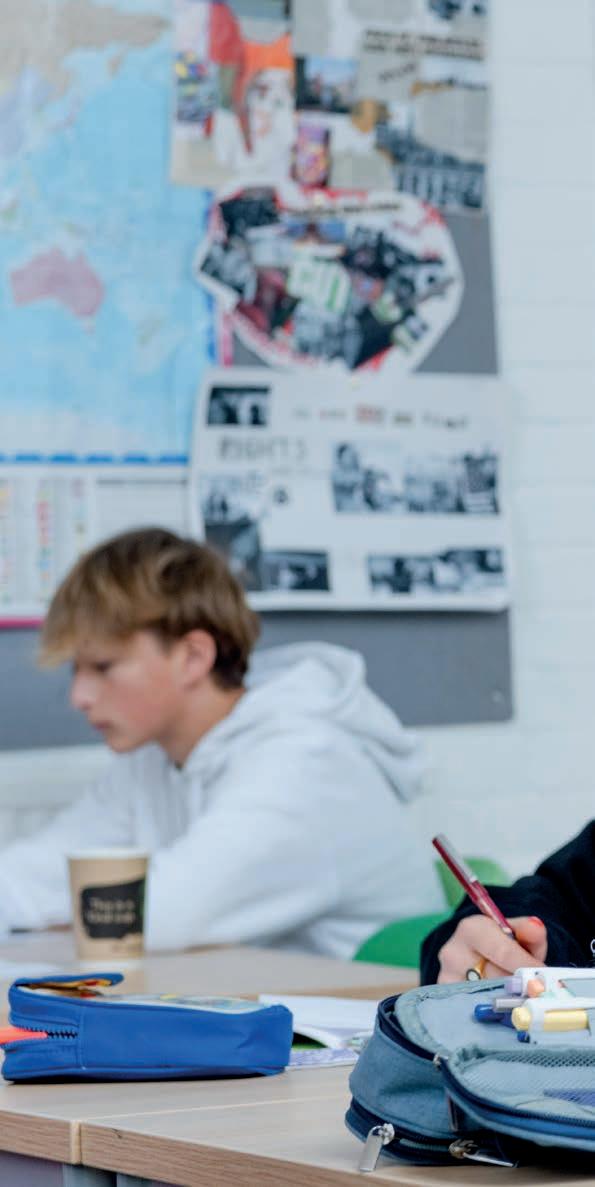


Rethinking Assessment is a group of school leaders from across the state and independent sectors, joining leading researchers, key policy-makers, employers and higher education representatives in order to broaden and modernise assessment to fully and fairly prepare young people for a dynamic world. Its work is research informed and evidence led, learning from promising practices in the UK and around the world.
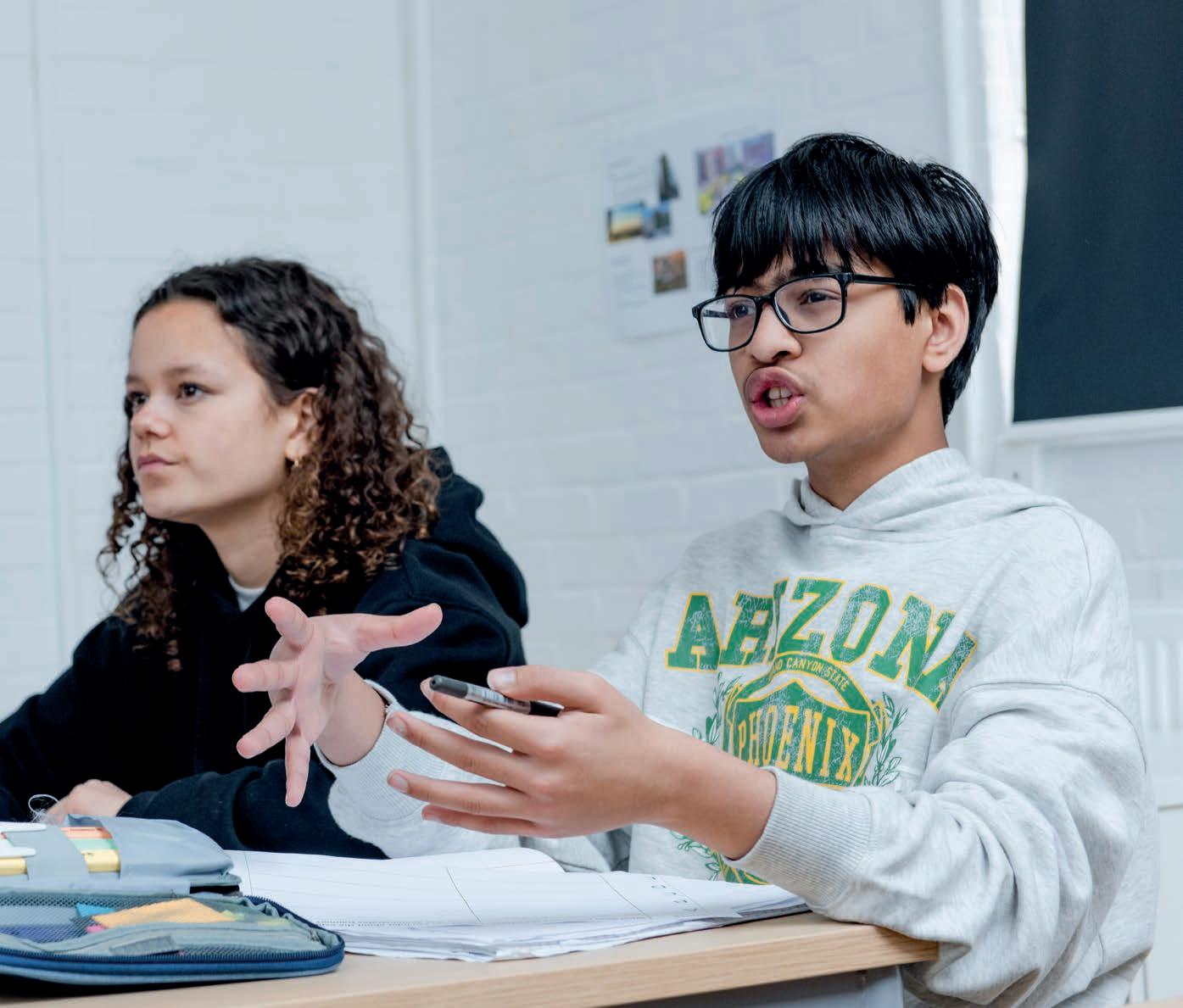
BY 2027, BEDALES WILL PHASE OUT all GCSEs, except maths and English language, which will still be required by UNIVERSITIES FOR DEGREE APPLICATIONS
1918:
A national School Certificate – was introduced by the Secondary Schools Examinations Council as the standard UK qualification for 16 year olds. During an era when most children left school at 16 or even 14, it gave children the chance to leave school with a recognised attainment level in six subjects, including maths and English.
1951:
In the next post-war period the certificate was replaced by the GCE O – or ordinary – level, as a pathway to the also-new A-levels. Children studied for and sat exams in individual subjects, with a grading of A-G but with A-C accepted as the passing grades.
1965:
National qualifications were widened with the addition of the CSE – Certificate of Secondary Education – to offer less academic students the chance to gain vocational qualifications.
1986:
The GCEs and CSEs were combined into GCSEs to provide a wider certificate for school leavers or to aid entry into higher or further education. From their inception, the exams were regularly criticised for being too easy, leading to the addition of the A* grade in 1994 to distinguish more able students and the 9-1 grading in 2017. The system has faced regular calls for reform or abolition, even from the ‘architect’ of the GCSEs, Lord Kenneth Baker, the Conservative Education Secretary. He has called the exams ‘outmoded’. The Government has announced a Curriculum and Assessment Review which is expected to consider reforms to GCSEs.
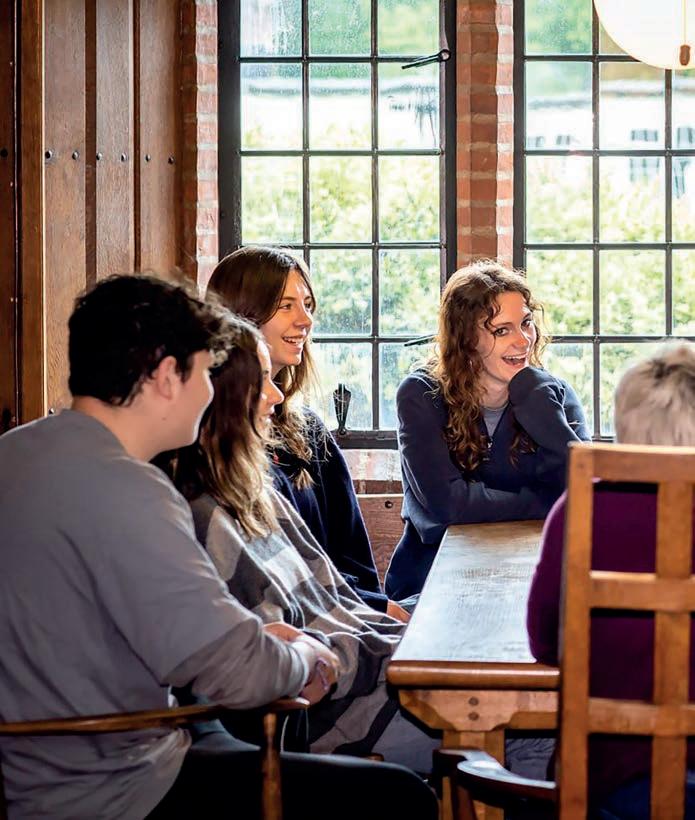
The Government says exams are the fairest way but we don’t think that only doing exams is fair, because some kids aren’t cognitively well set up to do their best in those particular conditions,” he explained.
“In English literature, by getting away from the GCSE, we’re able to choose a wider representation of cultures in the texts that we use and we’re able to assess them in a broader way so, instead of just sitting an exam at the end of two years, we thread different assessments and different kinds of assessments through the two years and pupils build up a portfolio, so they’re assessed on that alongside the exam elements.”
Pupils at King Alfred are given a choice of studying the new English literature course or taking the existing GCSE with “the vast majority choosing our own internal course”.
Another key player in challenging the status quo has been Latymer Upper School in west London, which is also phasing out GCSEs in favour of its own courses.
Like Bedales, it too will only offer maths and English language GCSEs from 2027.
Its Senior Deputy Head of Academics, Ian Emerson said the school launched a comprehensive consultation in 2019 before developing its replacements for GCSEs.
“We don’t think that GCSEs are fit for purpose and they

“WE DON’T THINK GCSES ARE FIT FOR PURPOSE and they aren’t stretching our kids at a time wben their brains ARE REALLY ACTIVE AND RECEPTIVE”

aren’t stretching our kids at a time when their brains are really active and receptive and not preparing them well enough for A-levels,” he explained.
Mr Emerson said the results of their research “chimed with other current thinking” and led them to start developing their own courses.
“We needed to do what was right for our young people. We’re an independent school and we really need to exercise that independence.”
The new courses, which are designed in-house by staff, combine “scholarship with skills” and “start with the premise ‘what would we want a brilliant A-level student to know when they start A-levels?’ and work backwards”.
The school also plans to offer short courses which will act as ‘extension courses in certain subjects’ to years 10 and 11, as well as interdisciplinary courses, including one on climate change.
Alternative forms of assessment alongside exams are being researched including open-book assessments and vivas – where children can orally present their ideas.
Internal moderation will be combined with external accreditation and benchmarking against GCSE outcomes, explained Mr Emerson with gradings likely to be “pass –level 7, merit – 8-9, and distinction for beyond GCSE level”.
King Alfred School is also developing and offering innovative project qualifications as an alternative to
GCSEs, which encourage pupils to “grapple with real world interests, learn some context and do something about it”.
Its current Global Challenges Higher Project Qualification enables students to undertake a solo project in one year and a group project in the second year.
Around a third of the school’s current GCSE cohort are studying for it and recent projects include a group collaboration with a migrant centre as an antidote to looking at the causes of the summer riots and wanting to take some positive action.
Ultimately, McConville envisages the school will offer students the chance to study six GCSEs with three alternative qualifications alongside them.
Both schools believe that what they’re working on could be shared and adopted by other schools, both independent and state.
At Latymer, Ian Emerson said it was exciting for staff to be “involved in writing and delivering a new curriculum” and the school was “proud to be leading the way” where he hoped others would follow.
“We’re the first big and major successful day school to say that we’re going ahead and doing this because we believe in it. We’re unapologetically setting up a whole new education and qualification agenda.”
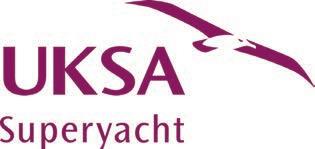
Traveltheworldonasuperyachtwhileyouembarkonan excitingcareerandearnwhileyoulearn.Thisisthepathwayfor studentsaged18-25onUKSA’sSuperyachtCadetship.

Icouldn'trecommendtheCadetshiphighlyenough. It'sabrilliantlypackagedcoursethatgivesallthe relevantqualificationsandexperiencethatyouneed inordertomakeyoustandoutfromthecrowd. Whetheryou'vegotprevioussailingexperienceornot, youwilllearnlotsnotonlyaboutthemaritime industry,butyourselftoo.

Gaintheskillsandqualificationstobuildalong-termcareerinthesuperyachtindustry
OptiontotakeaFoundationDegreeandafullBScalongsideyourCadetship
Payoffcoursefeeswhileworkingandtrainingonboardasuperyachtwithan averageDeckhandsalarybeing€2,800-€3,500permonth
Dedicatedcadetshipmanagerwithsuperyachtexperience Purposebuilttrainingfacilities,includingstateoftheartTRANSASsuite,
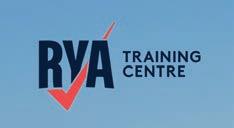
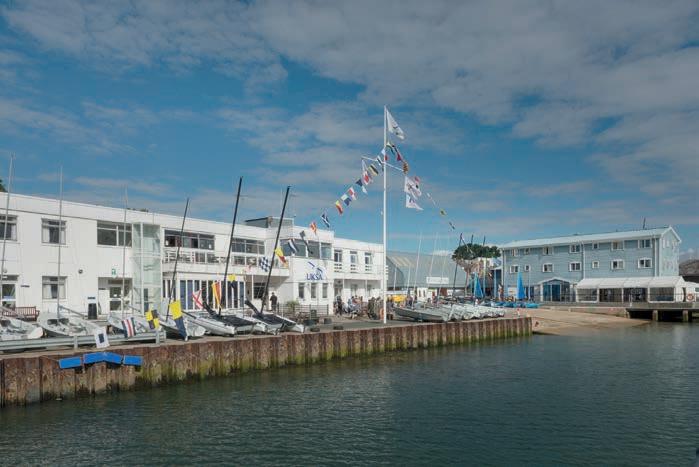
Itis–justaskanyoneofour networkofover1000graduates whoareworkingaroundtheworld.






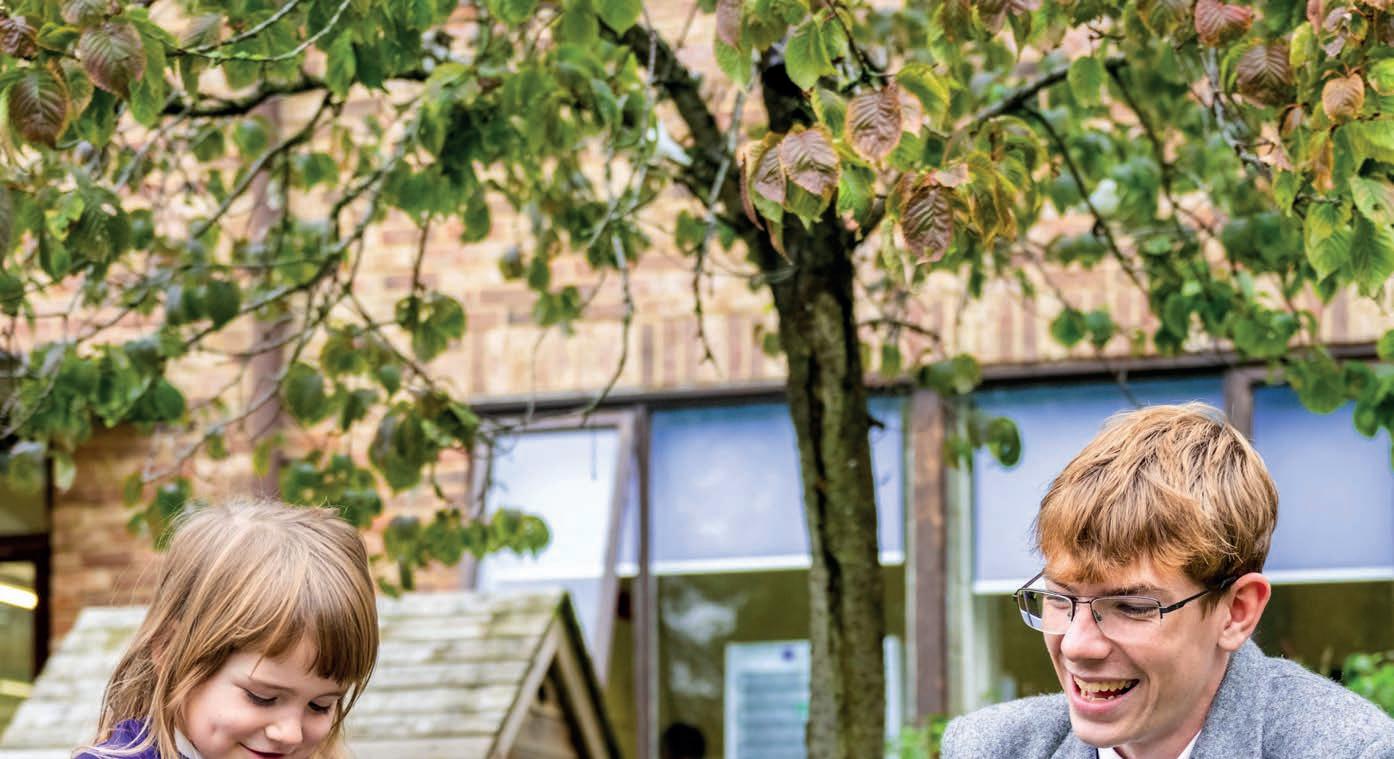
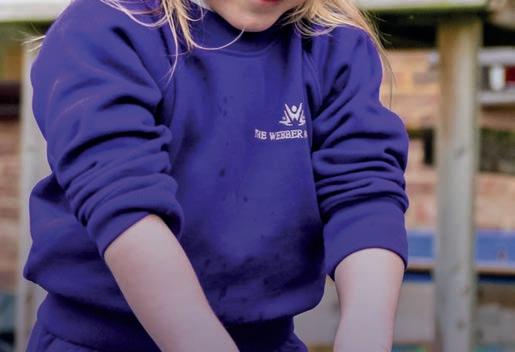


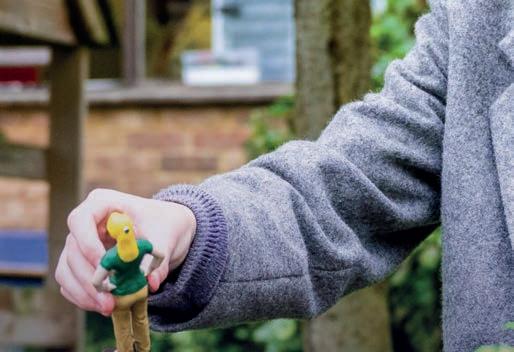


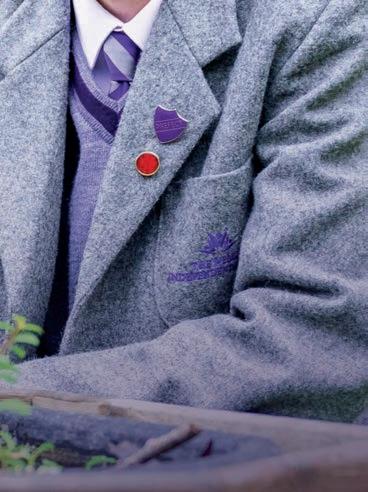



Tom Wade, Assistant Head, Digital Strategy and Learning at Haileybury, shares how the school is embracing AI platforms to enhance learning
Artificial Intelligence, also known as AI, has been a hot topic over the last year but isn’t always fully understood. AI essentially refers to a collection of technologies that allow computers to perform tasks that are similar to human intelligence, such as problem-solving, decision-making, data analysis and creativity.
Still in its infancy in education, AI is being used to varying degrees in schools across the UK. While there’s been interest in how it can support teacher workload, there have been concerns about the risks to learning. Subsequently, some schools are banning AI, while others are using it.
At Haileybury, we believe AI is here to stay, with young people already using it in their everyday lives, from Siri reminders to Spotify recommendations. Therefore, rather than ignoring it, we’re proactively embracing it and ensuring that we understand how it can be harnessed effectively, as well as the possible pitfalls. We can then teach pupils how to use it successfully, responsibly and safely to bolster independent thought, enhance learning and support critical thinking to equip them for successful careers.
We undertook extensive research, speaking to schools and experts internationally who are using AI; launched staff and pupil working groups; trained our teachers and they experimented with different tools to find the best solutions for subjects; and created a school-wide strategy.
As part of the strategy, we wanted to bring our parents onboard. We held webinar training for families to support their understanding of AI, answer questions and showcase the positive power of AI, giving practical demonstrations of
how it’ll be used in learning. Additionally, we explained our AI policy and sought parental permissions, crucial when using AI tools for pupils aged 13 to 18, so parents knew we were keeping their children safe. For example, we ensure that no pupil data is entered into AI platforms.
We continue to keep parents updated through fortnightly AI newsletters, which include training videos and information about what we cover in digital innovation lessons. We also host workshops to educate parents and pupils on the ethical implications of AI, discussing the importance of not plagiarising, understanding bias in AI systems, and using AI to complement, but vitally not replace, their own thinking. We also introduced a yearnine AI course to further educate pupils on the ethical debate and develop their digital and analytical skills. Our



approach is ‘process vs product’ so pupils can use AI as part of their process, but the ultimate final product must be entirely their own work.
We distilled down the five AI apps that we felt would best aid learning through our working groups. These were Perplexity for AI-assisted research, Canva for design, ChatGPT for text interaction, PI for verbal interaction and support, and MagicSchool for safely distributing AI tools to pupils and teachers. We trained pupils in using these applications in assemblies and videos and our pupil digital leads provide regular feedback on AI tools, highlighting emerging trends or issues. We’re also actively engaged with educational companies in trialling AI apps and providing feedback on their development. Our pupils and staff have a
RATHER THAN IGNORING IT, WE’RE proactively embracing it and ensuring that we understand how it can be harnessed effectively, AS WELL AS POSSIBLE PITFALLS s


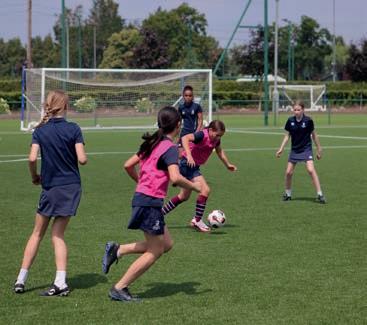


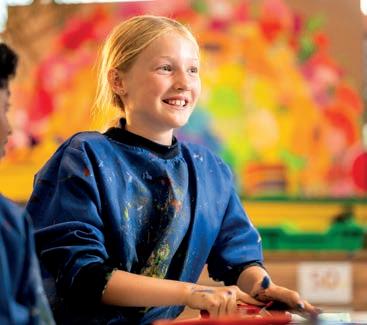





WE FLIPPED OUR HOMEWORK MODEL and now set pre-lesson learning and research for homework, rather than RECAPPING LESSONS AND WRITING ESSAYS

real impact on the future of AI in education.
These tools have already had a significant impact. Sixth formers report Perplexity searches almost entirely replace Google searches and provide more useful educational responses and our art department teaches Canva as part of the core curriculum. Our theology and philosophy department created revision GPTs on ChatGPT, where pupils can ask questions and receive support, curated to only include validated information, offering 24/7 support.
We also flipped our homework model and now set pre-lesson learning and research for homework, rather than recapping lessons and writing essays. Pupils gather information using AI and other sources, building knowledge just as they would via a textbook. Then, within lessons, we have meaningful discussions about their findings, interrogate sources, cover the curriculum and set handwritten essays. This teaches pupils about AI’s shortcomings and ensures that they apply what they have learned to their own work.
We now provide support to schools globally in developing their AI policies and embracing AI in education. For us, AI is a tool that supports teachers, not replaces them and if harnessed effectively, enhances the learning experience for pupils. We strive to be at the forefront of integrating AI into education in a way that benefits pupils while also prioritising ethical considerations. Looking forward, we’ll continue providing resources and support to pupils and parents as AI continues to evolve in the educational landscape.
1
Personalised learning: Many apps that young people use for learning, such as Khanmigo and Duolingo, use AI to tailor the learning experience for the user. This means that they can adapt to strengths, weaknesses and pace. These apps adapt in real time to keep users engaged.
2
Homework aid: Young people frequently turn to AI for support with their homework tasks. Tools like Grammarly are free to install and improve writing and grammar. Tools like Quizlet are popular to aid revision while apps such as Photomath allow the user to take a photo of a maths problem, which AI solves with step-by-step instructions.
3 Editing: Photos uploaded on to a young person’s social media may have been edited to look perfect. Samsung and Google phones now have AI editing built into them and Apple is releasing more AI photo tools this autumn.
4 Creating: From AI-created music on platforms such as Suno (where some of their tracks have millions of plays) to AI art and enhanced creative tools on platforms such as Canva, AI is allowing young people to access their creative side more than ever. Interestingly, this is the area of AI technology that some people have the biggest misgiving about, as they feel it shouldn’t be used as part of the creative process.
5 Chatbots: Today, young people regularly engage with chatbots as part of their daily routines. They use chatbots to seek information, create content using sophisticated language models like ChatGPT, or seek advice from platforms like Snapchat. Platforms such as Character.AI enable young people to converse with AI versions of famous or fictional characters. With many chatbots now employing realistic voice models, these interactions will soon transition from text-based to voice-based conversations with AI.


Keith Metcalfe explores how independent schools’ fee assistance programmes, such as scholarships can ensure that talented sportspeople of the future are given all the resources and training needed to succeed

As the sporting world went crazy for the summer Olympics, we were all reminded how the goal of ‘stronger, higher, faster’ can create a massively positive energy among young people from every background and nation across the globe.
Countries and organisations within the UK, such as Sport England, have worked hard to promote and source funding initiatives to ensure that sport is available to all. As an educator and leader of a school that truly promotes an holistic approach to education,
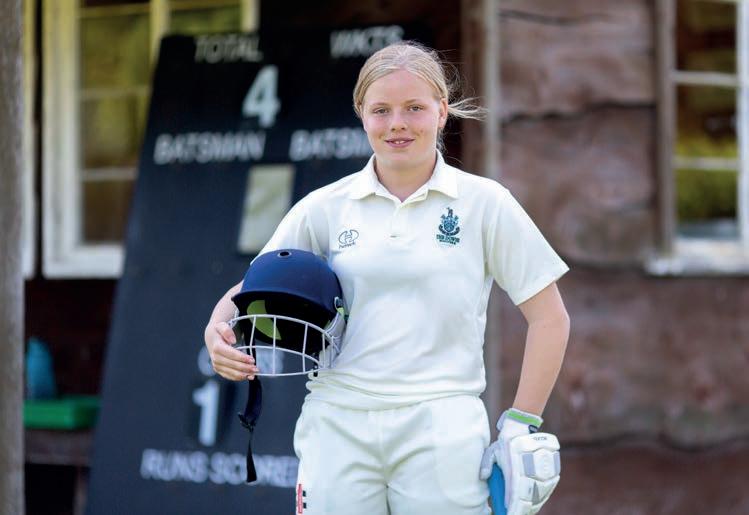






where we look for every opportunity to develop positive attitudes to learning, personal growth and impact on society, I’ve particularly loved hearing the back stories to the various sportsmen and women who have almost always talked about the coach, teacher or mentor who inspired them to follow their dream, set their targets and achieve their goals.
All educators want to encourage commitment and support the hard work required to develop talents, while also ensuring nancial status isn’t a barrier to achieving success.
at’s across the board, regardless of
whether you work within the state or independent sector and, for those who have the ability to support others to achieve that aim, it is something which is a privilege to do.
Scholarships and bursaries for an independent school are a very e ective means of doing this, and these vital initiatives have helped generations of pupils from all backgrounds to access rst-class education and greater opportunities in sports, the arts and in academia. It’s long been an accepted
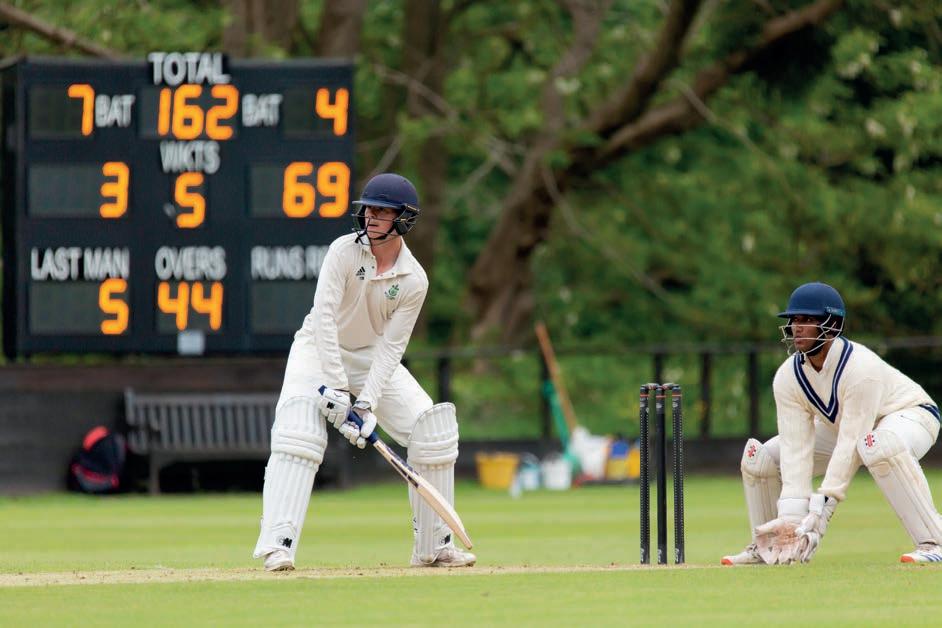
WHILE THE NUMBER OF ATHLETES AT THE OLYMPICS with an independent-school background has come under scrutiny, it’s not so well publicised just HOW MANY OF THESE WERE ON SCHOLARSHIPS AND BURSARIES
philosophy that those who can, support the education of others through philanthropy.
We only have to take a look back at a summer of sensational sport and some inspiring reactions to that competition – both from medal winners and those yet to reach that goal – to see what an impact these programmes can have, not only in developing sporting prowess, but also in all of the transferable skills, inner-confidence and core qualities that are developed alongside.
While the number of athletes at the Olympics with an independent school background has come under scrutiny, it’s not so well publicised just how many of these were on scholarships or bursaries, or where the independent schools were working in partnership with local clubs sharing facilities, coaches and mentoring opportunities.
Before they reached Paris, each of these athletes had to start somewhere. Families may have worried that a certain type of school isn’t right for them, or that they wouldn’t qualify for a scholarship because their child isn’t a grade eight musician or playing sport at a national level.
But take inspiration again from Team GB, many of whose stories start with a chance interaction with somebody who just spotted their potential. Schools are the same: they’re looking for that spark of potential and attitude. They specialise in taking raw potential and developing it within each child on their

individual journey to becoming the finished article – they’re not expecting to see the end result before the journey has begun.
In most cases, a bursary is a means-tested financial award to support the family’s ability to pay the school’s fees.
The ‘scholarship’ part means the recognition of that spark of potential, which is usually the first hurdle to being eligible for a bursary and can be part of the entrance process for that school. This entrance process is likely also to involve some entrance tests and an interview.
The process will try to establish aptitude and thinking skills, rather than prior knowledge. The school will be more concerned with how well your child can learn and what attributes they have, which means they contribute to life at the school in a positive way. One of the key aims here is looking for young people who they can support to grow into adults who will add value to the world outside of the classroom, thanks to the education they’ve had.
A lot of this will be probed using appropriate questions during an interview. When
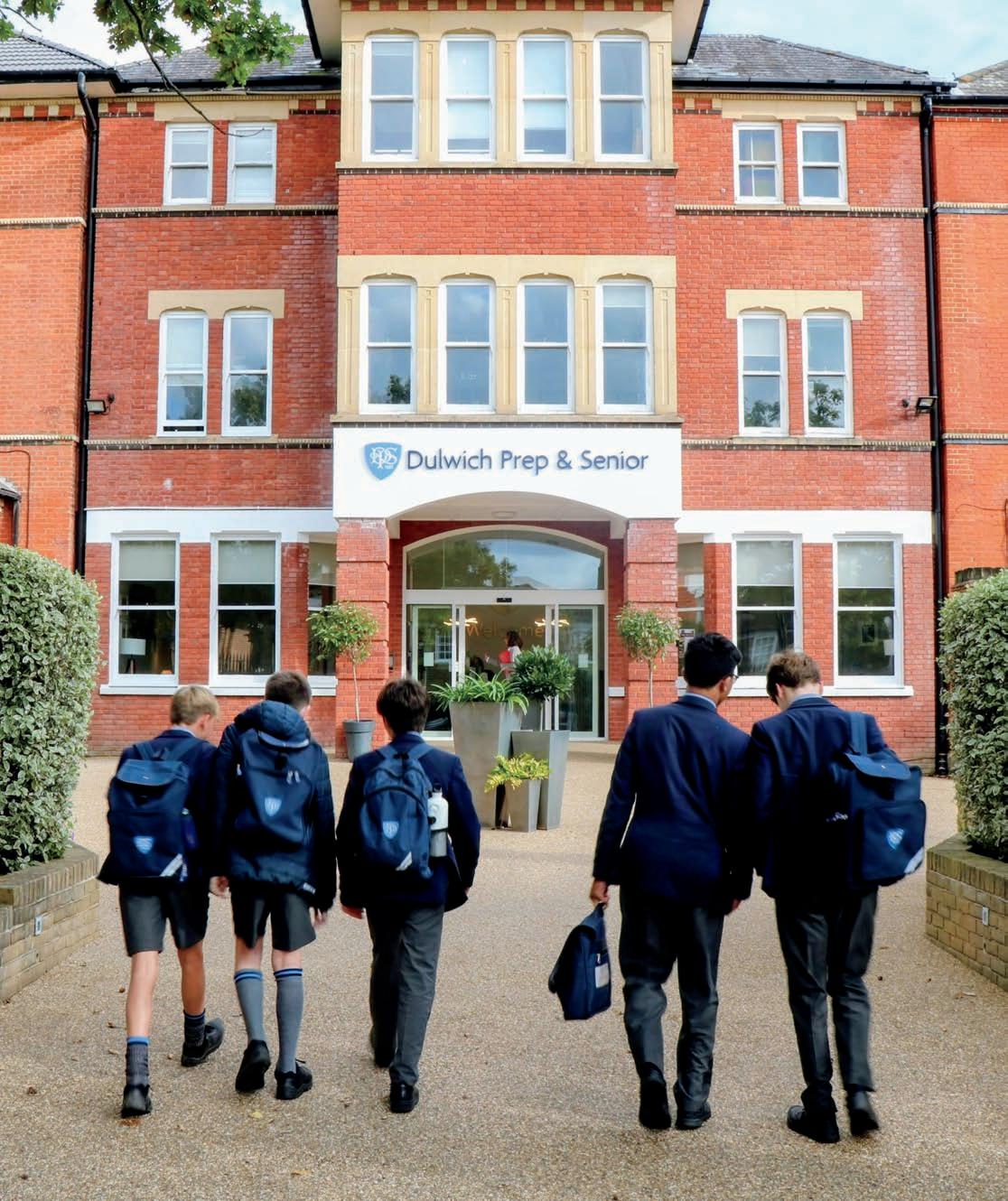

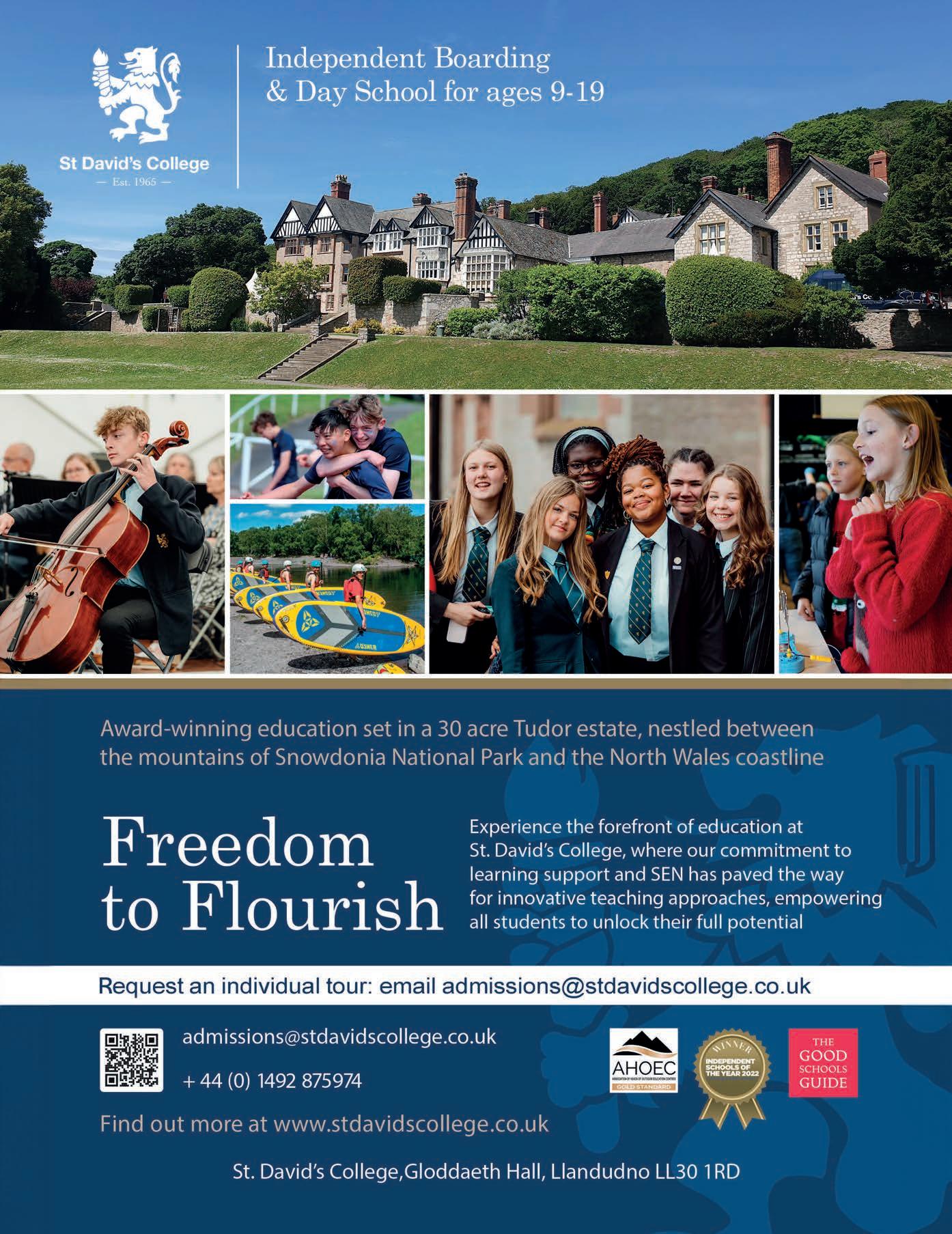


headteachers and admissions teams talk to potential pupils, they’ll be looking to see if they’re curious, independent thinkers who demonstrate self-awareness, as well as empathy for others.
At Malvern College, we regularly repeat the message about making the most of any and every opportunity, and this process is no di erent. It’s always worth giving it a go, as very o en schools go to great lengths to make entrance exams and scholarship days a really engaging experience in their own right. ey’re very aware that they’re looking to help children demonstrate their potential and will do everything in their power to bring out the best in them.
If a family is eligible for a bursary, how much that will be is means-tested against your household income, and can vary from school to school.
Schools may have other schemes in place to help cover extra costs, so it’s always best to
OUR TRANSFORMATIVE SCHOLARSHIPS and bursaries inspire children to reach their greatest aspirations, and expectations are HIGH FOR ALL SCHOLARS AND AWARD HOLDERS
ask as schools are only too ready to discuss all options. Essentially, schools want to help those children who would most bene t from what they have to o er and will want to nd a way to make it happen.
At Malvern College, our transformative scholarships and bursaries inspire children to reach their greatest aspirations, and expectations are high for all scholars and award holders, not just in their pursuit of excellence but in their conduct and behaviour.
Making a di erence
ey’re also an integral to our ethos of creating role models that not only inspire while they’re at school but also go on to make a positive
di erence beyond school. Scholarships are o ered at 11+ (for prep school, e Downs Malvern), 13+ and sixth form.
We have a long tradition of providing opportunities to children who would thrive in our school environment but lack the nancial means, and we’re very proud of our inclusive cohort. Bursary awards are means-tested and if needed, can cover up to 110 per cent of school fees, funded by philanthropic support.
e college’s admissions team are wonderful at helping guide people through the process to make it as accessible as possible. I would urge anyone who feels that they’d really bene t from the support that’s in place to contact the team to talk it over.
Boarder
Melino Fakahau
When did you apply for the bursary?
Mr Tisdale visited my prep school when I was in year seven and watched me playing rugby, then my family applied for a Malvern College bursary while I was in year eight.
Can you give a rough timeline of your bursary application process?
As I was on a full bursary at Caldicott Prep, the application for a bursary was considered alongside my scholarship application.
How much did you know about bursaries?
Not very much at all! There were a few other good, wellknown schools that I looked at, but I really enjoyed my visit to Malvern College. My parents are from Poland and Tonga, and London is my home. Therefore I knew wherever I went to school, I’d need to be a full boarder, so I’m very grateful to be on a bursary here.
Did you apply for a bursary at another school, or just to Malvern College?
Malvern College was the only school I applied for a bursary at because it was the one I set my heart on.
How easy or difficult was it to secure the bursary?
, 14 shares his experience of earning a Malvern College bursary and how he’s immersing himself in its rich sports programme

Do you have bursary provision for the entirety of your school life?
Yes, I do.
What qualities do you have to have to consider applying for a bursary?
I’m very thankful that Mr Banks, my Headmaster from Caldicott Prep, saw my potential and recommended me to Malvern College. I’m already playing rugby for the school, Ledbury RFU and Gloucester Academy, as well as playing cricket and football.
I love sport and I’m ambitious, but I also bring academic qualities. I love history, DT and maths, so I hope that I’m also
Caldicott supported my family through the application process and the college admissions team did the same, to ensure we had all the support we needed. CASE
MALVERN COLLEGE WAS the only school I applied for a bursary at because it was the ONE I SET MY HEART ON
a good pupil for the school! With my passion for sport and the boarding environment, I’m a good team player. I take part in lots of extracurricular activities, including CCF and I’d say I lift spirits in my House. I like to think I’m a good allround Malvernian!
What checks does the school make to ensure that you’re a worthy candidate?
The college uses an independent third party to assess a family’s needs. This means-testing process indicates the level of support a family needs to join the college, which is considered by the Bursary Committee.
Which members of staff know you have a bursary, and do other pupils know?
Most staff know I’m on a bursary in the same way they know who in their class is a scholar. I don’t know which other pupils know I have one, hopefully they just know me as Melino, or the boy who likes rugby, or the boy in their boarding house!
What impact has receiving a bursary had on your family?
They’re really proud I’m here at Malvern College, which is such a good, prestigious school. I told my sister all about it here and she decided to apply and join for sixth form. She’s also on a bursary but more importantly her scholarship means she has a place to develop her volleyball, football and rugby. As well as covering fees, bursarial support allows me to get kit for all the clubs I play for and travel to matches and coaching sessions. The bursary and the support from Malvern means I can follow my dreams.
£47,600 average starting salary for a Norland Nanny through the NorlandAgency
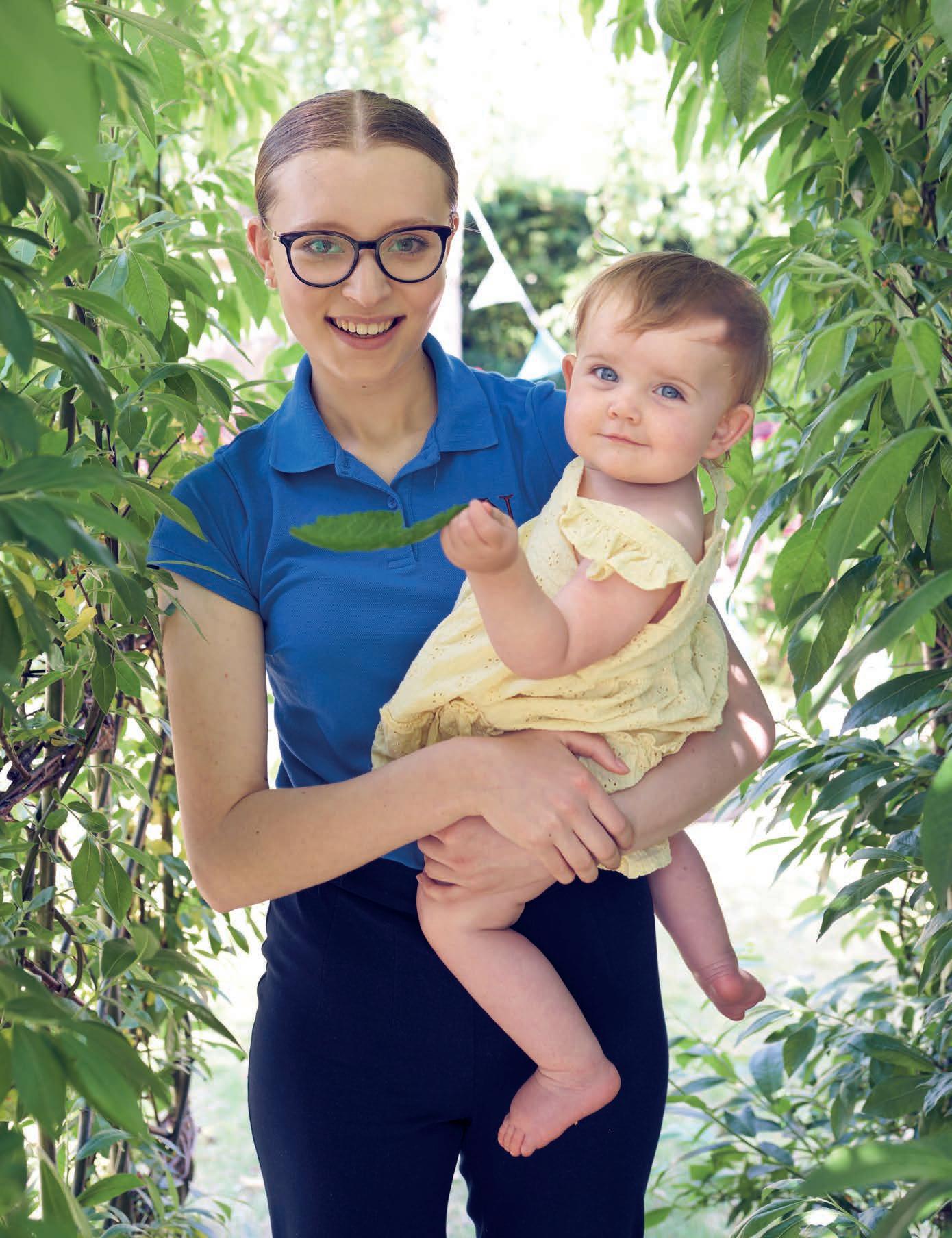
Award-winning BA (Hons) Early Childhood Education and Care degree with skills-based diploma.
Guaranteed 100% employability and one of the highest average graduate earnings supported by their own dedicated employment agency.
An outstanding career working with children and families as a highly sought-after Norland Nanny.






Explore our outstanding training and career opportunities













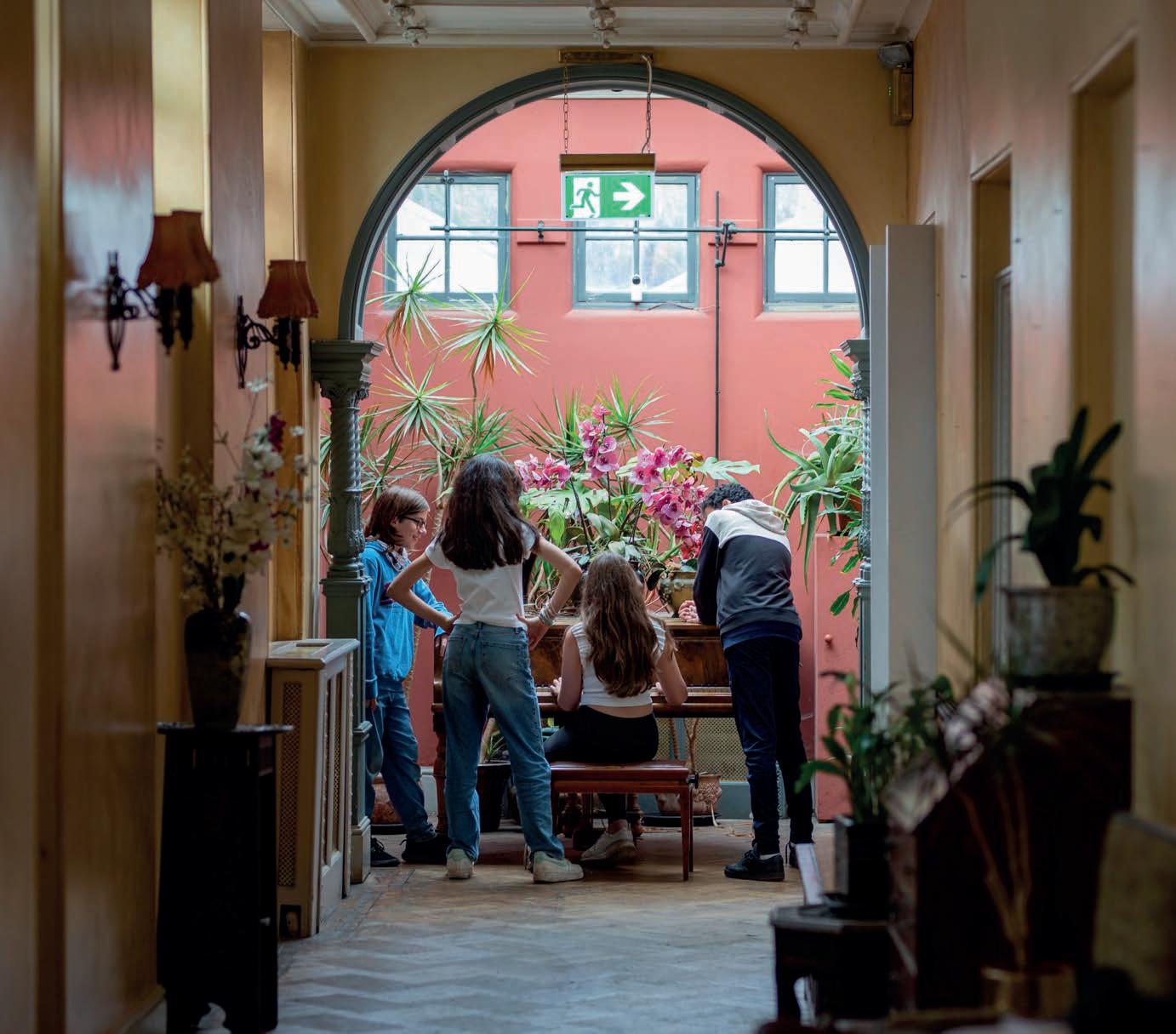
ASK THE EXPERTS
How are schools monitoring pupils’ mobile phone use?
We ask five educationalists their advice
Katherine Vintiner Hampton Court House School, Richmond
At Hampton Court House, we’re always seeking out new ways to enhance our students’ learning experience. Last year, we took a bold step by introducing secure Yondr pouches to lock down students’ phones during the school day. is wasn’t about rejecting technology, but nding the right balance.
We anticipated resistance, but were concerned about how habitual phone use was a ecting focus and communication during the school day. Within weeks, the change was clear. Students were more engaged in lessons, less distracted, and their communication skills noticeably improved.
It was heartwarming to see students of all ages at breaktime, sitting in circles, playing board games, chatting, and truly enjoying each other’s company.
A recent survey con rmed the positive impact of this mobile-phone policy: more than 90 per cent of pupils felt less distracted, 82 per cent found it easier to concentrate, and 70 per cent reported improved mental health. Many also discovered new ways to communicate and strengthen friendships without relying on their phones and social media.
MOBILE PHONES ARE BRILLIANT IN MANY WAYS, but a lot of self-discipline is needed, so we’re actively encouraging parents of NEW YEAR SEVENS TO CONSIDER NON-SMART PHONES
David Edwards
HABERDASHERS’ MONMOUTH SCHOOLS
Alexandra Haydon FRANCIS HOLLAND SLOANE SQUARE SCHOOL
Emma McKendrick
DOWNE HOUSE SCHOOL
Lara Pechard ST MARGARET’S SCHOOL
Katherine Vintiner HAMPTON COURT HOUSE SCHOOL
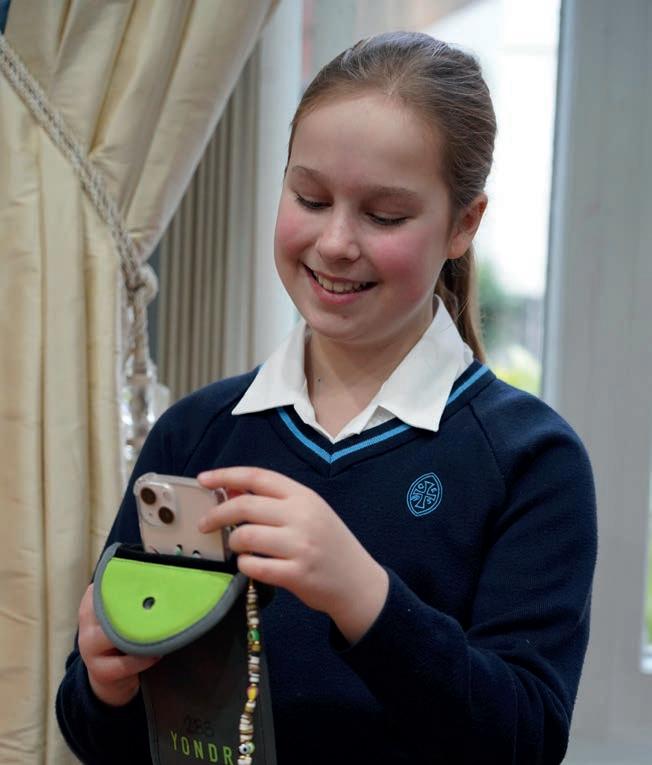
Alexandra Haydon
Francis Holland Sloane Square School, London
We have a phone-free policy for years seven to 11, using bespoke technology from Yondr, a company that works with educators, artists, organisations and individuals around the globe to create phone-free spaces where genuine connection, focus and creativity can ourish.
Our pupils are given a Yondr pouch to store their phones in for the duration of the school day. e pouch is locked magnetically, so girls are still in possession of their phone at all times but are spared from the distraction it poses, leaving them free to concentrate fully on learning and having fun! Unlocking bases are placed at main exit points of the school at the end of the day, upon which girls simply tap their pouches to release their phones ready for


their journey home.
Mobile phones are brilliant in so many ways, but a lot of self-discipline is needed to use these powerful devices appropriately, so we’re actively encouraging parents of new year sevens to consider non-smart phones for their daughters. By locking their phones away during the school day, our pupils can focus on connecting with each other in real life and escape the tyranny of noti cations, all while having the security of knowing their phone is in their possession. To have so many phonefree hours every day releases precious time for far more worthwhile activities than sel es and scrolling, and applying the policy to entire year groups removes the ‘fear of missing out’ that results from individual con scations, so girls are able to relax in each other’s company and develop healthier young minds.
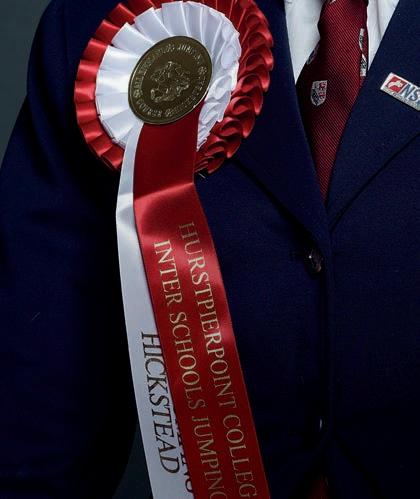




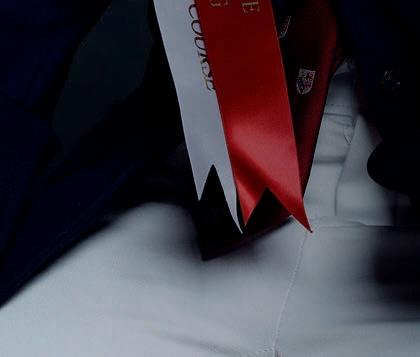
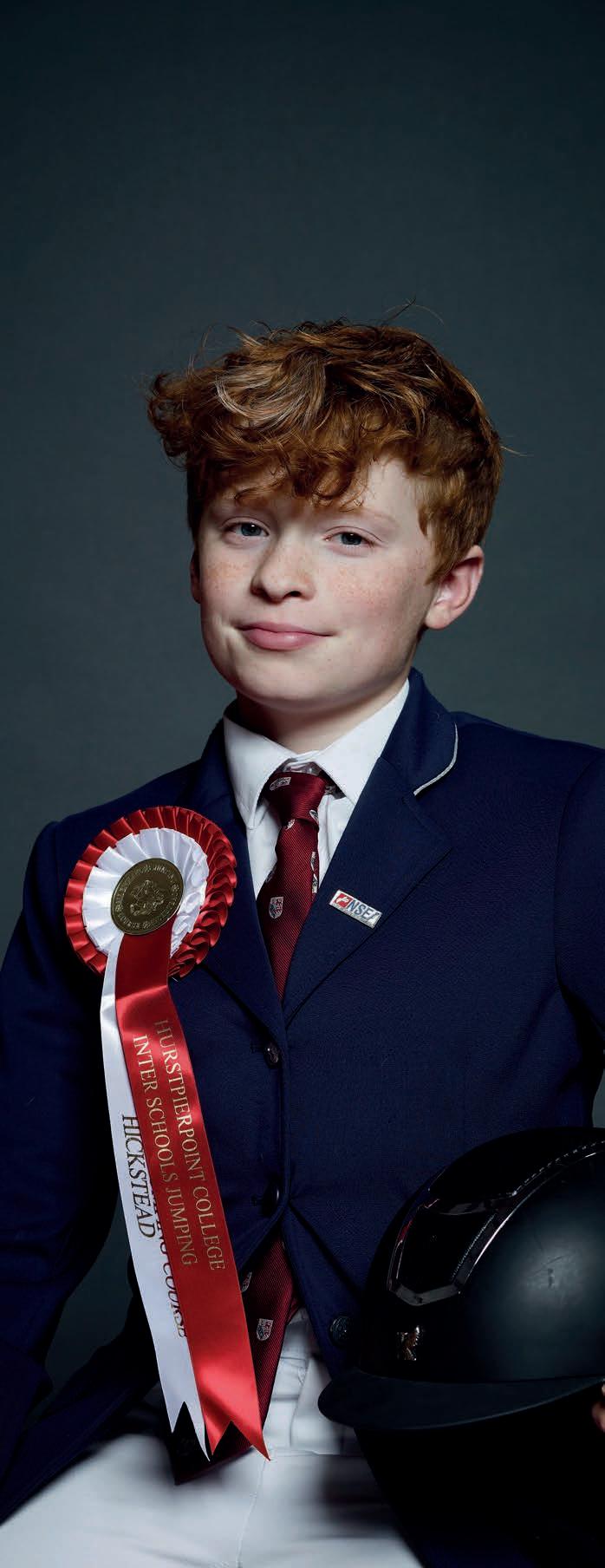





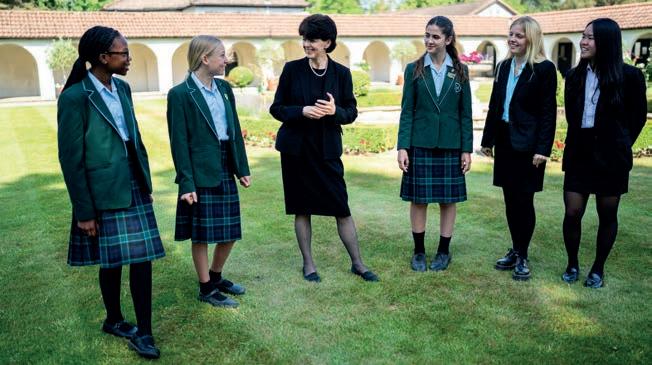
Emma McKendrick, Headmistress, Downe House School, Berkshire
We recognise the impact constant connectivity through mobile phones can have on both our pupils’ wellbeing and their ability to build meaningful in-person relationships, which are so important for a happy and ful lled life. We want our pupils to learn how to use phones e ectively and healthily; this includes within the boarding community so they have the ability to contact family and friends, especially when far from home.


respect and kindness, we aim to guide pupils in making healthy choices about how they INTERACT IN PERSON AND ONLINE
David Edwards Senior Deputy Head Pastoral and Co-curricular, Haberdashers’ Monmouth Schools,
Wales
At Haberdashers’ Monmouth School, pupils are allowed to carry phones, but they must be switched o and not used during school hours (8:30am–4:05pm). Pupils needing to contact parents can do so from reception. Unauthorised phone use results in con scation for the day and an a er-school detention, with repeated o ences leading to escalated sanctions.
Given our rural location and our co-curricular activities a er school, access to a mobile phone is needed, especially for those using school and public transport. However, we believe the key lies in educating pupils to use technology responsibly, rather than enforcing a complete ban.
By emphasising core values such as respect and kindness, we aim to guide pupils in making healthy choices about how they interact with each other, both in person and online. is approach encourages responsible use of technology while ensuring their safety and wellbeing.

We therefore focus on age-appropriate access to phones in the evenings only, starting with year seven having half an hour of phone time and increasing this gradually each year. Phones are handed in overnight, except for our nal year students, and the wi is switched o half an hour before bedtime. More, but controlled access is granted at weekends, again graded according to age and the activities being undertaken. I want our pupils to have experienced the bene ts of living in the moment without phones, and to have the con dence to choose when they use their technology rather than to fall under the spell of the app designers and developers. Our policy will therefore need to remain under constant review to achieve this.
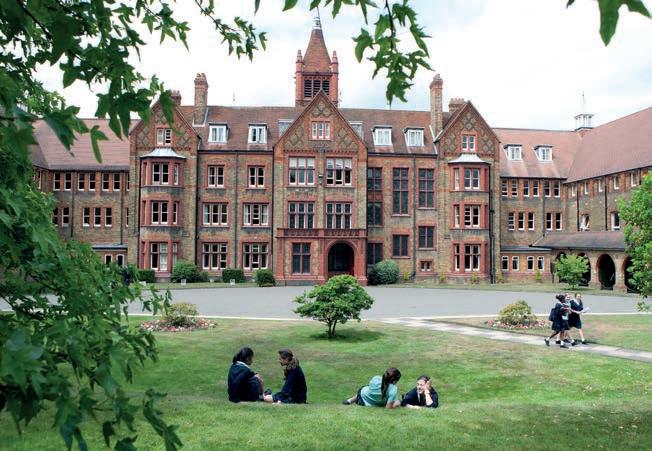


Lara Péchard Head, St Margaret’s School, Hertfordshire
Our school has a no-mobile-phones policy. As a result, it’s unusual to see a student using their mobile phone during the school day. is initiative has not only been incredibly popular with our parents and sta , but it’s also wellrespected by our students.
As parents, we have a duty to help our young people nd a healthy balance between phone usage and the physical world. A er all, it isn’t just teenagers that overuse their devices. In fact, many of us have found distraction, comfort and social interaction through using our
mobile phones. As such, teenagers will be quick to highlight the hypocrisy of an adult’s overuse when challenging theirs, so modelling the right behaviours from the top down is a priority.
Tackling the overuse of mobile phones and the need the phone ful ls, must be the rst aim when educating young people. Moving forward, we need to encourage more open conversations at school and home about the behaviours we might not like to see around usage but in a way that attempts to understand, empathise and support our young people by outlining our concerns and the consequences, rather than making a sanction or expressing judgement.









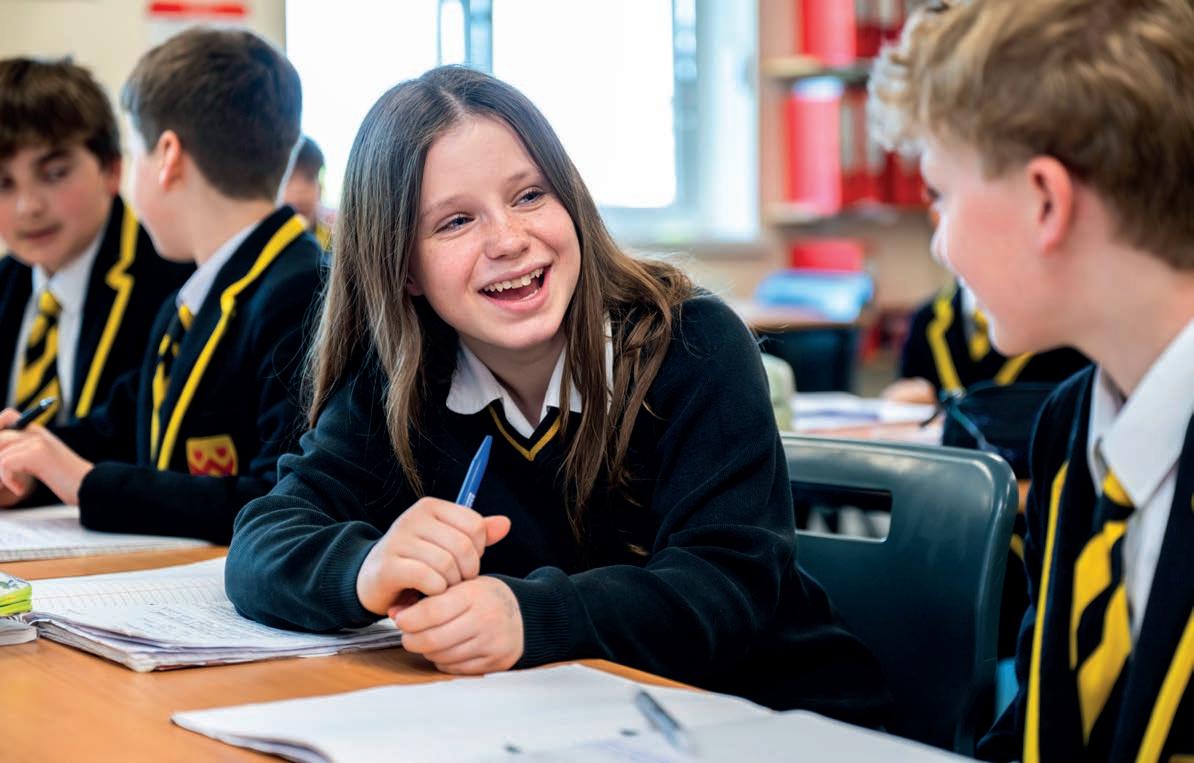


King’s College School Wimbledon’s partnerships provision hugely impressed our ISOTY judges awarding it a well-deserved finalist spot
Over the past 30 years, we’ve worked together with local community groups, schools and charities to run initiatives that benefit both young and old in our local area, and which care founded on four principles: sustainability, impact, mutual benefit for all stakeholders, and a commitment to challenging disadvantage.
Currently we work closely with colleagues at 33 local maintained secondary, primary, special and sixth form schools, with this number continuing to grow year on year.
We work closely with our partners, who share our ambition to constantly build upon and develop new ways to collaborate. Recently, our longstanding relationship with Harris Academy, Wimbledon led to the development of their new sixth-form offer. Staff and pupils from King’s and
Harris now work together, benefiting from joint academic extension, university preparation and community projects. HAWI sixth formers also come to King’s to join lessons in specialised subjects, enriching their learning journey and our classrooms. Joanne Larizadeh, Head of HAWI, says: “Our first six months have been highly successful and are exceeding our initial expectations. The project is equipping students with important life skills while enabling them to make a valuable contribution to our local community.”
Our partnership programme is at the centre of school life, we’ve built it into the very core of our curriculum. Every Friday afternoon, 400 King’s pupils participate in more than 50 diverse partnership initiatives overseen by 70+ teachers. Our pupils thrive by running a variety of different activities, including leading science and Latin sessions, to running a s
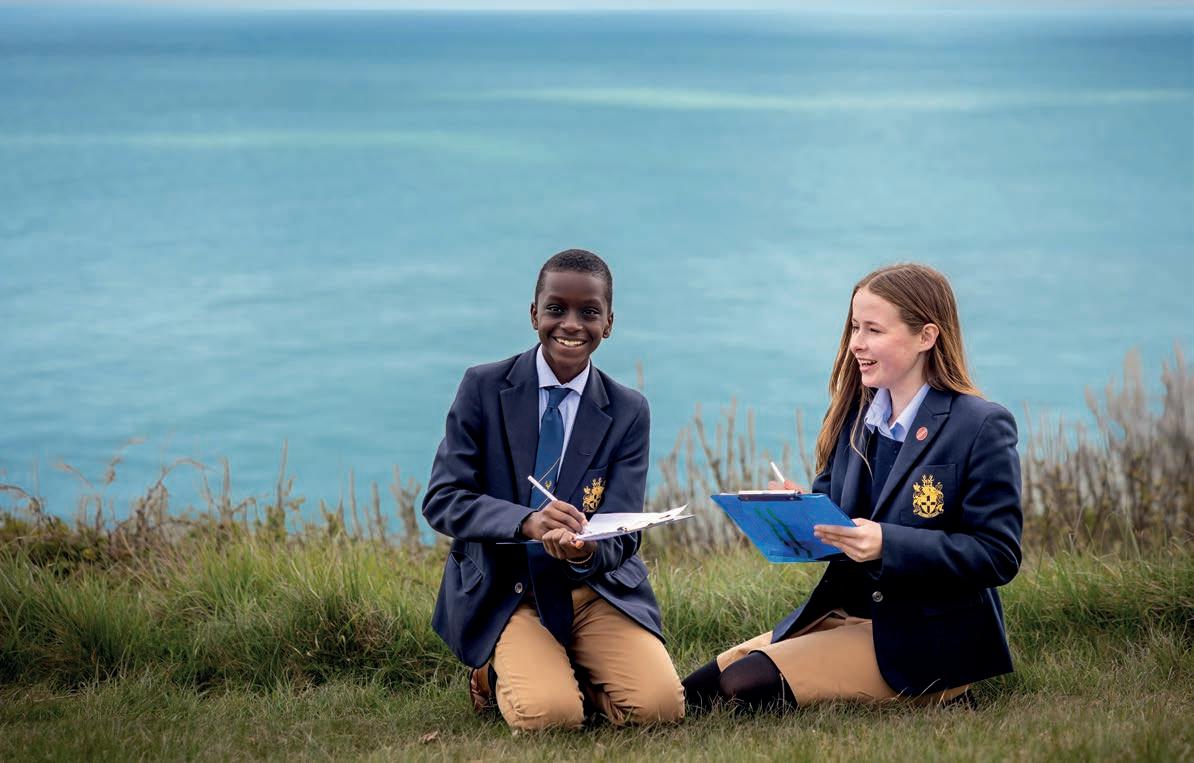






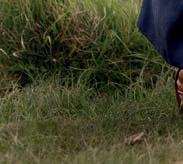





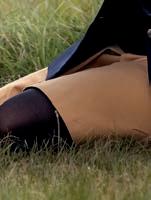

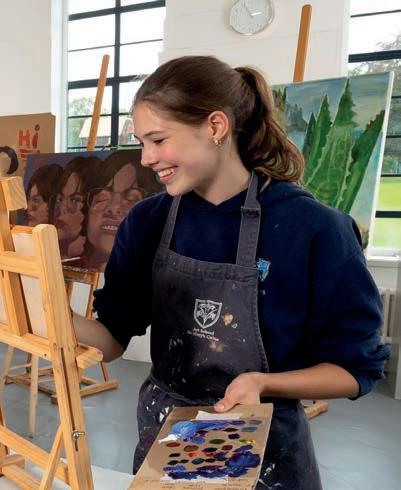
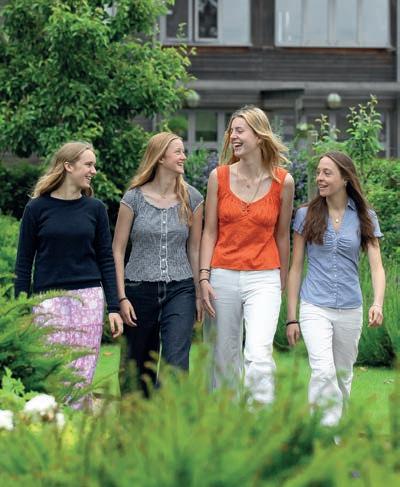









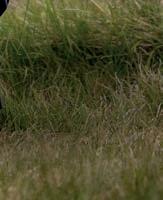





NETWORK, we were able to involve more than 2,370 young people from our local area OVER THE LAST YEAR ALONE


KCS works with 33 local state primaries, secondaries,
blues orchestra and swimming lessons. They enjoy sharing biscuits and tea with elderly residents during Friendship Hour and helping to maintain local church yards.
This spring, King’s pupils and students from eight different partnership schools took part in the annual community production, The Time Machine. This was the culmination of an ambitious two-term collaboration between all the schools, which formed a company of more than 150 pupils, comprising actors, singers, musicians, composers, backstage technicians. Their performance was enhanced by meticulously crafted props and puppets, skilfully created by artists and engineers from King’s and Bond Primary School.
Through our partnership network, we were able to involve more than 2,370 young people from our local area over the last year alone. This included supporting 250 pupils at our partner schools to become the first person in their families to go to university, and a further 100 pupils who

came to our GCSE reinforcement classes, which were taught by King’s sixth form mentors and staff.
Through all our partnership initiatives, pupils from King’s and the partner schools develop essential skills including leadership, empathy, and teamwork. Questionnaires help us gauge feedback, revealing positive trends such as improved empathy skills reported by 54 per cent of King’s students in January 2024 – a remarkable 95 per cent increase compared to October.
When we asked our pupils recently what they had learnt from their involvement in partnership projects, responses included: “Fostering a sense of unity and empowerment within the community” and “to help young children gain knowledge and confidence”.
The Berkshire senior school’s four pillars are intrinsic in developing and sustaining a Pangbourne College education



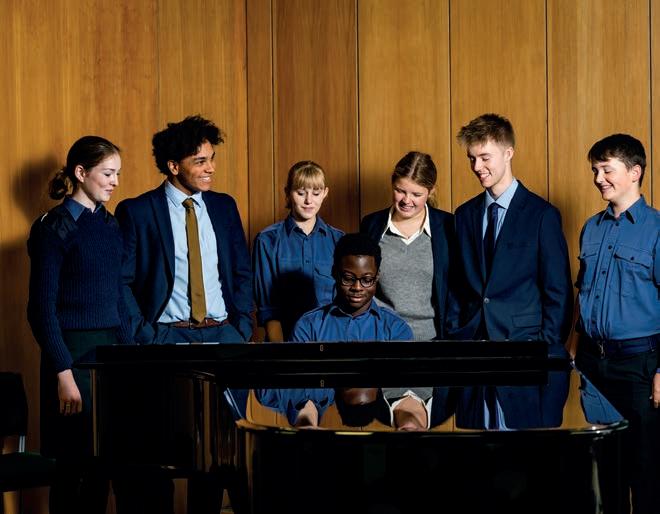
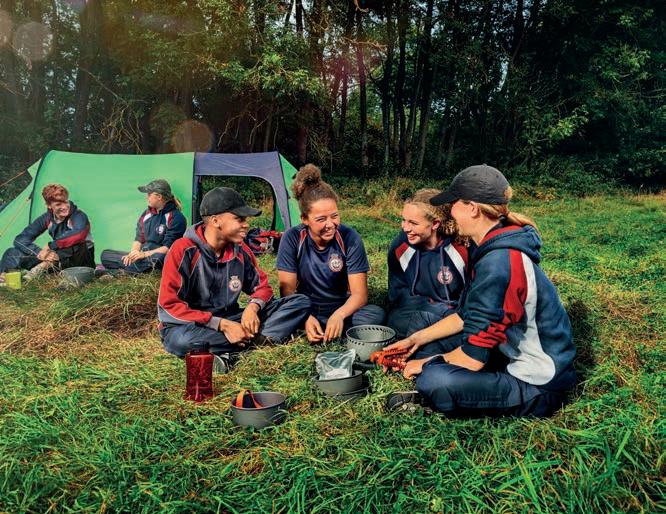
Pangbourne College is honoured to receive The Sovereign’s Gold Medal – a prestigious award that reflects values that endure here to this day. Awarded annually by the monarch to those who demonstrate outstanding leadership and character, its history is a tale of persistence, royal recognition, and commitment to upholding the highest standards.



BETWEEN 17 AND 20 PER CENT OF UK sixth formers now attend independent school for THE FINAL TWO YEARS OF THEIR FORMAL EDUCATION
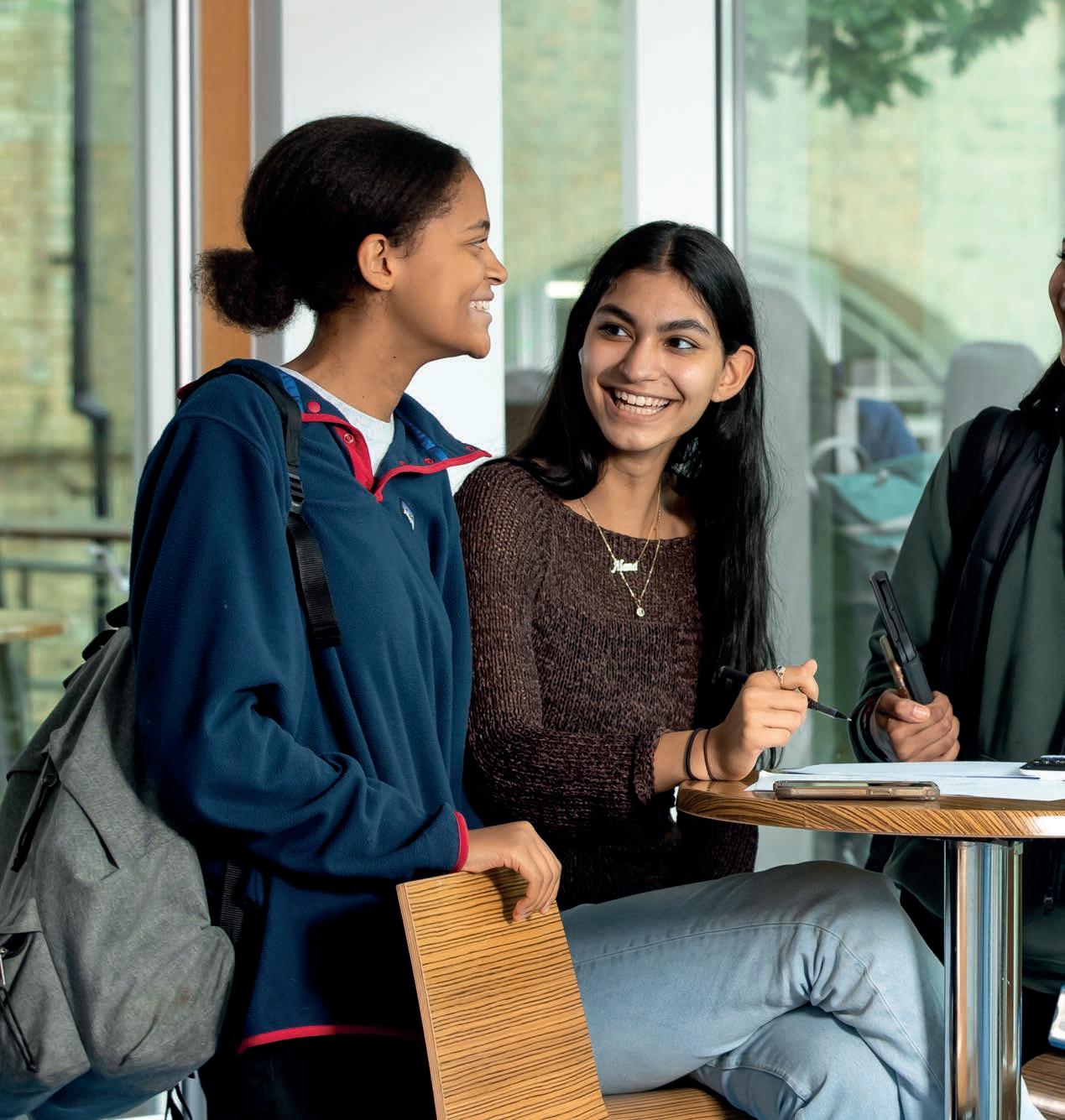
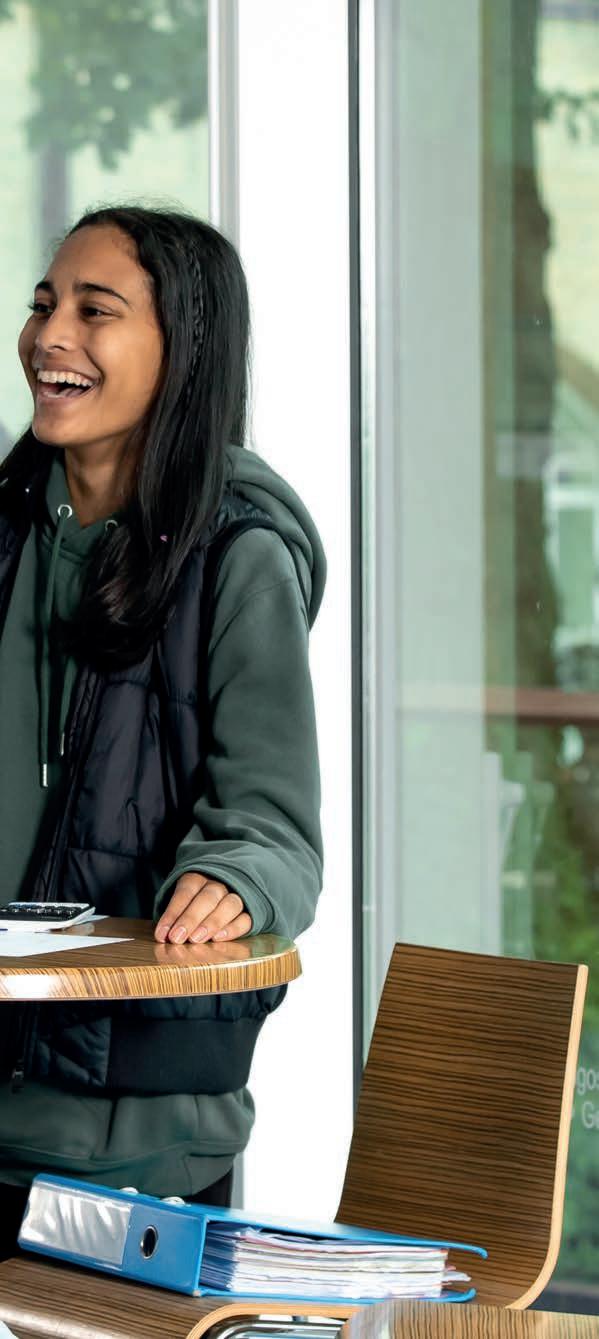
Sixth form provision at an independent school isn’t all about academics: it’s a bespoke all-round experience. Here, Roedean in East Sussex and North London Collegiate in Edgware give an insight into their unique offerings
Between 17 per cent and 20 per cent of UK sixth formers now attend independent school for the final two years of their formal education, according to research1
Until recently, families made the decision to remain in the independent sector or jump in from the state sector simply because they were following stats showing brighter academic outcomes. It was, to be frank, all about the A*s.
nurturing approach
But then Covid-19 came along, raising the profile of the importance of good mental health and wellbeing, particularly in the young. And this has played a part in the shifting sixth-form landscape, so that now the best 16+ providers are just as concerned with the all-round wellbeing of their teens as they are their grades. This holistic approach has mushroomed across the offering in the independent sector, so that schools s
• Retain a weekly structure (which teens still need) but still build in plenty of flexibility so students mould their own week.
• Ensure students have easy access to counselling and pastoral support if they need it.
• Broadening the academic offering, so that traditional subjects are complemented with more modern disciplines.
• Encourage and support sporting passions and present new options beyond the traditional.
• Opportunities for leadership, responsibility and personal development through senior roles at school and creating chances to deal with the wider world.
• Underscoring community values, encouraging pupils to look beyond their studies on a weekly basis.
now offer a timetable stuffed with chances to develop soft skills, plus a ton of extracurriculars tailored to what sixth formers want, as well as lots of encouragement around sport and fitness. This is offered in a close pastoral framework with an emphasis on preventing problems.
At Roedean, Director of Sixth Form Carmel Carragher’s approach is that her pupils are being prepared for life just as much as university. “Year 12s have life skills sessions built into the week. These can be about anything from eating well and healthy body image to how to develop good sleeping habits and receiving good relationships education. Sessions are guided by what the students want so there may be sessions on dealing with bereavement or something career related, like setting up a good LinkedIn profile. We send questionnaires out to students to get their feedback and we try to react to what the cohort ask for. It’s very dynamic, as we respond to the changing needs.”
Miss Carragher also underlines the confidential free counselling that students

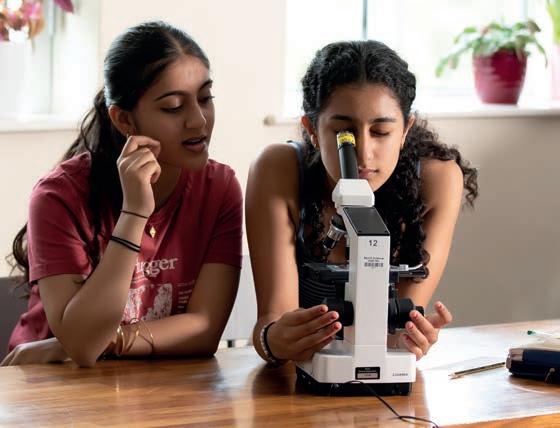
can access, adding: “Right at the start of sixth form, pupils will talk to someone confidentially and we’ll try to identify who might need help going forward and make a connection straight away, so that if the wheels do start to come off at any time during sixth form, they know who to come to and are familiar with that face. It’s important that when a crisis happens, you already know the person you’re going to for help.”
A school known for its top-tier academics, North London Collegiate School (NLCS) in Edgware also has this holistic, 360-degree approach to nurturing its students. Head of Sixth Form Benjamin Tosh explains: “There’s a network of staff to support the girls
pastorally. Every girl has a dedicated mentor and it’s quite typical for really meaningful relationships to flourish. Every form group has at least two tutors and with just six year 12s joining a form group each year, that means there’s space and time for our staff to get to know their tutees’ strengths, interests and talents.”
Those intangible soft skills – confidently talking to strangers, presenting your own ideas, debating a viewpoint – are also something that’s baked into life at these sixth forms. NLCS boosts confidence hugely by offering leadership roles to every sixth former through its senior societies, a model it has borrowed from top American universities. Students are responsible for leading the cultural and intellectual life of the school, from inviting speakers through to organising publications, journals and podcasts.
Across an academic year, NLCS is visited by more than 200 speakers, almost all of whom are student invited.
Said Mr Tosh: “Our senior societies programme means that a sixth former might act as a chair for the Pure Sciences society or a publicity officer for the Performing Arts society. She might lead activities for our younger students in the junior school. It’s not all deadly serious either – in January our year 12s are
NLCS, WHICH BOASTS THE BEST IB RESULTS in the country, offers a staggering 48 subjects in sixth form, WHILE ROEDEAN HAS WIDENED ITS SELECTION
helping with a school partnership science investigation day for year sevens, based around a crime scene looking at DNA extraction. Our sixth formers are kindly playing the part of the suspects!”
Of course, academically, choice and breadth do still play a huge part in attracting students. NLCS, which boasts the best IB results in the country, offers a staggering 48 subjects in sixth form while Roedean has widened its selection so that
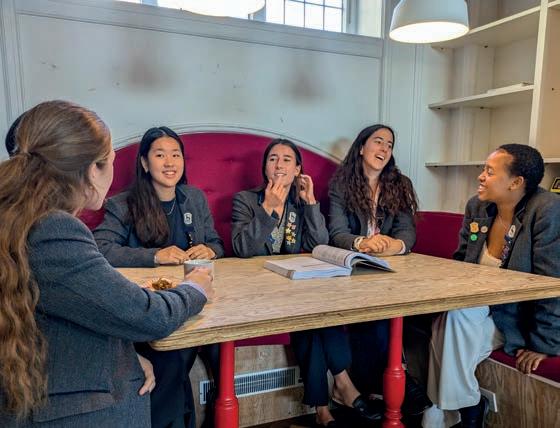
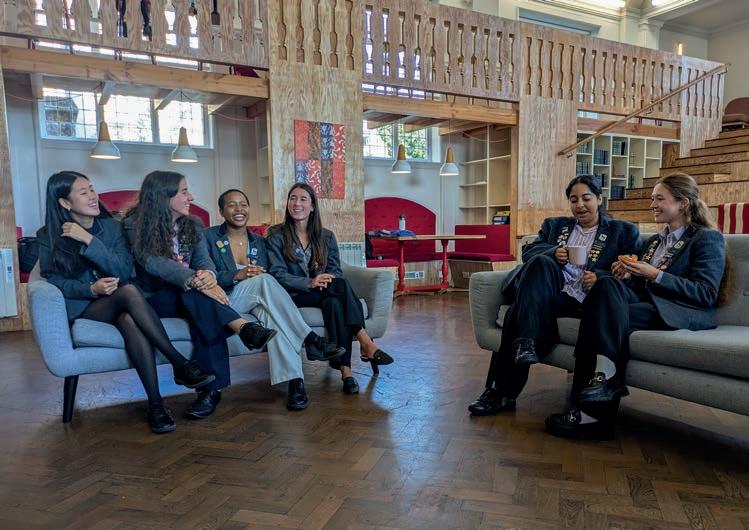
the traditional subjects are boosted by more modern courses, such as computer science, dance and photography.
It’s no surprise that the fee-paying sixth form is having a moment. It combines a broad structure that teens still need with new freedoms. Its subject leads offer opportunities to go way beyond the syllabus, really bringing subjects alive, and its pastoral offering is fit for a postCovid-19 world.
Independent sixth forms are no stranger to the guest speaker and there are good reasons for this. The benefits of breaking up the week with a new face and a new story are manifold…
• Expertise: Speakers inherently have in-depth knowledge of their topic that teachers simply cannot provide. Whether it’s a surgeon who battled on the Covid wards, a mountaineer who set new records or a former student who has followed their passion to success, hearing what they do and how they got there can be transformational for students.
• Career exposure: Teens have only just started thinking about their working lives ahead – they need ideas! Hearing career journeys, setbacks and successes paints a picture that these careers are open to anyone.
• Authenticity: Nothing replaces face-to-face interaction and students often recall years later having been impressed and inspired by someone who came into their sixth form to speak. This conversation with a real-life aid worker/actor/scientist/judge – you name it – is far more memorable than any careers lesson.



























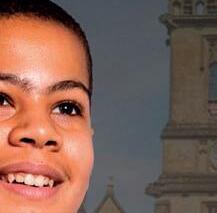





























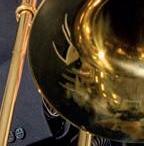
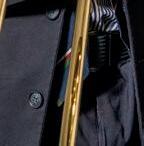



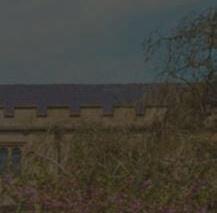






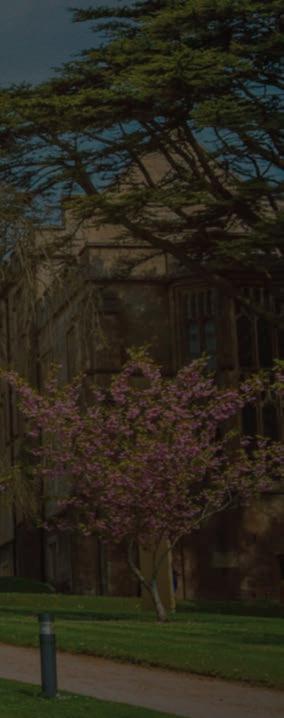
From training as a superyacht cadet on the open seas to soaking up centuries of art history across Venice, Florence and Rome on a gap year, there are many inspiring courses that today’s teens can take to enrich their futures ▲






If you’re looking for a life-changing gap year experience, then the John Hall History of Art Course which takes in Venice, Florence and Rome could be just the ticket
The Florence and Rome extensions are a major part of the whole Italian experience of the John Hall Venice course. eir individual, wholly di erent identities are especially striking a er Venice, and, a er seeing them, Venice’s singular qualities come into even sharper focus retrospectively. Many of the most privileged private visits are in Florence and Rome.
In Florence, students can study at rst-hand the progress of art out of the middle ages, into the new perspective-dominated realism of Brunelleschi, Masaccio and Botticelli and on to the virtuosity of Raphael and Michelangelo. ere are many incredible on-site visits including to the Medici Chapel, Santa Maria Novella, the Duomo and Brancacci Chapel, e course concludes in Rome, where the imposing remains of classical antiquity blend with the magni cent churches, palaces, fountains and piazzas of the Renaissance and Baroque popes and cardinals. ere is an incredibly special privilege of a private visit to the Vatican Museums, to include Raphael’s Stanze and the Sistine Chapel – a truly unforgettable experience. Also included
are visits to the Villa Borghese galleries, which hold masterpieces by Bernini, Caravaggio, Raphael and Titian. e churches, temples and stunning sites of this vibrant city are a superb climax to the nine weeks, leaving a truly lasting impression on everyone.
e nal visit is to Tivoli, taking in the gardens of the Villa d’Este, the most famous gardens in 16th century Europe. ere’s a spectacular lunch at the Ristorante Sibilla, by the Temple of Vesta – a restaurant and hotel always included in the Grand Tour of the 18th and 19th centuries.
Here, student and art-history enthusiast Lola Gri th describes her last two weeks of the John Hall Venice course which took her to Florence and Rome: “ e last two weeks of the John Hall course were de nitely a highlight of the trip. Although at rst leaving my new friends and the comfort of Venice behind seemed sad, when we were driving into sunny Florence it became clear that it was the right decision to take part in the extension.
“One obvious bene t of going to Florence and Rome was the opportunity to see the famous artworks and architecture of the cities,
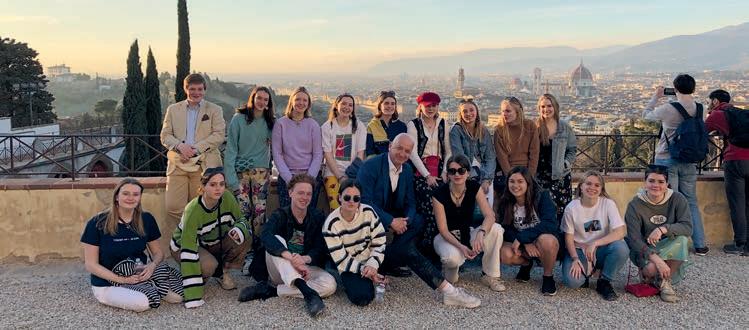
A group of John Hall students get a group shot with breathtaking Florence as a backdrop

IN FLORENCE, STUDENTS CAN STUDY AT FIRSTHAND the progress of art out of the middle ages into the new perspective-dominated realism OF BRUNELLESCHI, MASACCIO AND BOTTICELLI
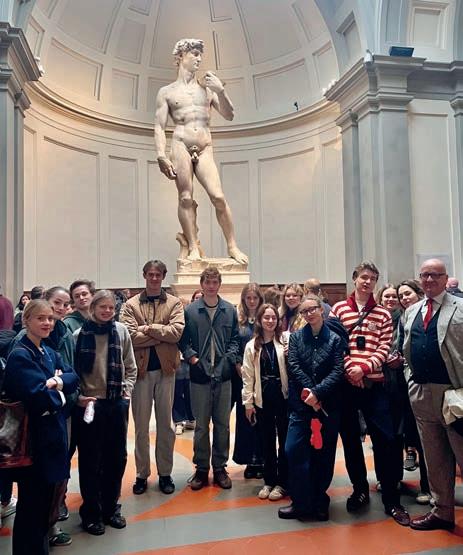

many of which we had been lectured on in Venice. With both of our hotels within walking distance of so many famous sights, such as the Baptistry and Palazzo Vecchio in Florence, and the Pantheon and Forum in Rome, we were able to explore them in our own time as well as with the group.
“Another perk of carrying on was being able to try more delicious Italian food. Being more global cities than Venice, Florence and Rome had more variety and different specialities when it came to cuisine, so trying these was as much of a cultural activity as anything else.

The last, but best, part of continuing with the course was spending lots of time with the other John Hall students. Spending the last two weeks with the group and getting to know people who you hadn’t been able to spend much time with before was the high point of the whole course. Everyone who ended the course in Rome talked about how well we had bonded and how much fun we’d had together. We all agreed that the friendships made were some we would keep forever, and were undoubtedly the reason to sign up.” johnhallvenice.com
• It’s handy to know that the ‘centro storico’ is tiny; you can walk from Santa Maria Novella to Santa Croce in about 40 minutes.
• Try the gelato! At Gelateria La Carraia just over the Carraia Bridge get a scoop of ricotta & pear, and at Vivoli in Santa Croce sample the rice pudding flavour.
• If you want to hang out with other English-speaking students, then you can’t go wrong with Piazza Santo Spirito where there are dozens of fun bars. Get the best sandwiches at Pino’s near Santa Croce.
• Head to the refurbished historical literary cafe Giubbe Rosse to follow in the footsteps of the futurists.
• The two areas that are the most fun are the well-known Campo de’ Fiori and Trastevere, where you’ll find Osteria da Zi Umberto: the service is lively and the food is superb.
• For a hang-out and quality wine, you can’t go wrong at Vinaietto where you can listen to locals natter away, then head up the street to Piccolo Vicolo, for authentic Roman cuisine.
• Caffe Sant’Eustachio, which sits between the Pantheon and the stunning baroque Sant’Ivo alla Sapienza church has the best coffee.



Are you between 18-25 and looking for an exciting career in the superyachts industry? The UKSA Superyacht Cadetship course is a structured programme designed to train future o cers

UK Sailing Academy’s (UKSA) agship programme, the Superyacht Cadetship, has been designed for 18-to-25 year olds and is a credible alternative to university. e structured four-year programme equips students with a strong foundation of knowledge, skills, quali cations, and a realistic understanding of the superyacht industry and is designed to train its future o cers.
e programme mixes classroom learning with practical training and paid-for work on superyachts. While the average debt for a university student in the UK can amount to £35,000 to £40,000, UKSA students can earn while they learn. With earnings from €2,800 a month tax free, cadets can pay o course fees while working and training within the industry. Working closely with leading crew agents, management companies and yacht captains, UKSA cadets are now employed in all areas of the sector – working in the superyacht industry can take students all over the world.
Cadets also have the option to take a foundation degree in operational yacht science during phase one and phase three of the Superyacht Cadetship, leading to a full bachelor of science if required.
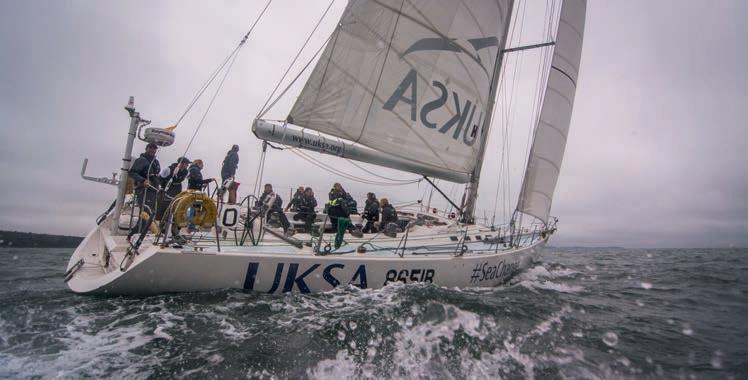

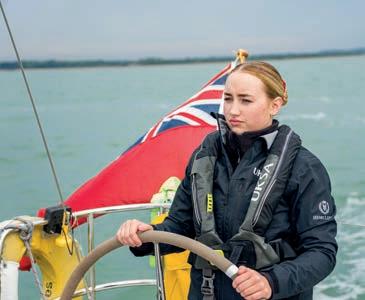


A superyacht cadetship is a great way to earn – and travel – while you learn



Course overview:
• A great alternative to university, the course begins September 2025
• 5 phased programme run over four years
• Purpose built classrooms and navigational training simulators all on one site
• Food and accommodation included during training phases at UKSA
Students will bene t from one-on-one mentoring, as well as CV/industry guidance. UKSA has a fantastic eet, an all-inclusive waterfront four-acre campus, dedicated instructors, and great facilities.
Course stages and qualifications:
Phase 1 – Essential Cadetship training –160 days (academic study)
• Develop all of the skills and knowledge required to gain an entry-level deck position on a superyacht
• RYA Yachtmaster O shore, STCW Basic Safety Training and many other quali cations
• Foundation degree in operational yacht science, year one completion

Superyacht training is covered in five phases, including a foundation degree
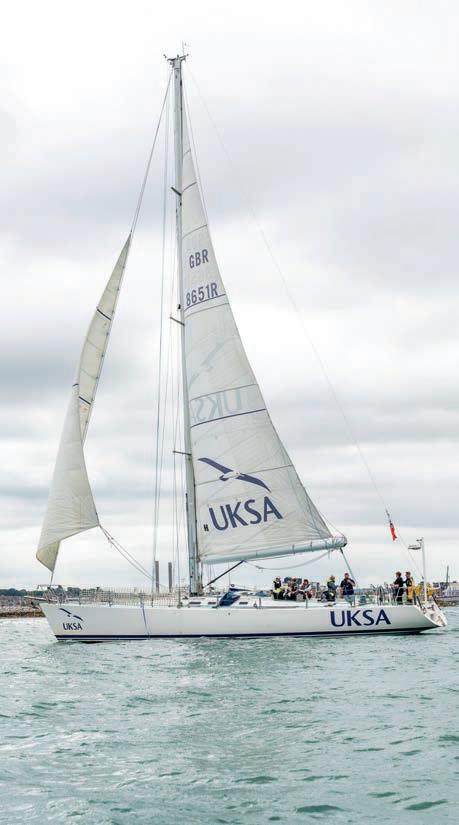

Phase 2 – Industry experience working onboard superyachts – 12-18 months (paid employment)
• Employment on a superyacht as an entry-level deckhand
Phase 3 – Yacht operations and management –3 weeks (academic study)
• Progress from junior deckhand to a more senior position onboard
• First steps to gain O cer of the Watch (Yachts less than 3,000gt) quali cation
• Foundation degree in operational yacht Science, year two completion
Phase 4 – Industry experience – 12-18 months (paid employment)
• Employed on a superyacht gaining watch keeping experience
Phase 5 – OOW training – 8 weeks (academic study)
• Final stage of O cer of the Watch (Yachts less than 3,000gt) training. Study senior modules towards nal examination.
• Applicants must be aged between 18 and 25 when they start the Superyacht Cadetship, but can apply when aged 17
• Excellent communication, oral and written skills, are essential, as is a good understanding of mathematics
• Cadets should ideally have GCSEs grades 9-4 (or equivalent) in English, maths and science
• If applying for the Foundation Degree – 48 UCAS points
• Attend a 2 day cadet selection at UKSA – selection dates running most months
Attend an Open Day to learn more about the Superyacht Cadetship and other career courses, meet the team, see UKSA’s four campus facilities and get a feel for what life as a future UKSA student will be like!
Call UKSA’s dedicated course advisors on +44(0)1983 203038, email careers@uksa.org or visit https://uksa.org/course/professionaltraining/superyachts/superyachtcadetship-course/
Independent-school alumni share their success, with careers in creative industries such as dance and film, as well as the sport, finance and healthcare fields

Dancer, Rambert School of Ballet and Contemporary Dance Wells Cathedral School, Somerset
I joined Wells in the lower sixth, specialising in dance for two years under the tutelage of dance teacher Miss Cannon. After 16 months of intensive training, plus tuition at National Dance CATS (Centres for Advanced Training) and the Sue Hill Dance School, and studying for my A-levels, I gained a place at Rambert.
I was also fortunate to receive offers from other esteemed institutions, including the Northern School of Contemporary Dance, Trinity Laban Conservatoire and The Place.
I had two auditions and it was unlike any of the schools I’d auditioned for before. The first audition consisted of ballet, contemporary, improvisation classes and a solo dance which I’d prepared. I was called back for the second round, making the final cut out of 500 dancers! Since the other candidates were so accomplished, I was doubtful I’d receive a place. So, when I received my acceptance email, I was over the moon. It was my top choice, but just over a year ago it had seemed impossible.
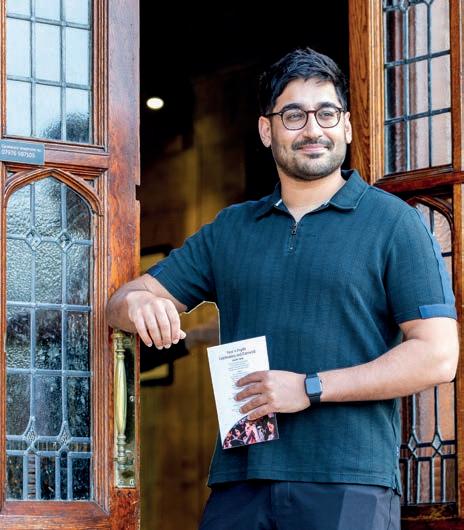
Visual effects producer Bradford Grammar School
I joined Bradford Grammar School (BGS) in year seven and stayed through sixth form, leaving in 2010. It was here that I discovered the power of asking the right questions – a lesson that has served me well in my career as a visual effects producer. From my early days at BGS, juggling multiple subjects and extracurricular activities and clubs like the Film Society, I learned crucial organisational skills and the importance of persistence.
Being polite and empathetic, values emphasised at BGS, have opened countless doors for me. It’s these qualities, along with the technical skills and life lessons I gained at school, that have helped me rise from an intern on Made in Chelsea to working on Hollywood blockbusters such as Guardians of the Galaxy and Star Wars franchises. The warm atmosphere and the supportive environment at BGS truly set the foundation for my success. My journey from Bradford to Miami, working on some of the industry’s biggest films, began with what I learned at school.
Paralympian powerlifter
Harrogate Ladies’ College
My time at Harrogate Ladies’ College was incredibly special; I look back and feel so fortunate to have had the experience of being a student there. I went on to study sports science at Leeds Trinity University. Among all the studying, in 2019 I was spotted at the National Dwarf Games for Para Powerlifting, and from there I was put on the National Talented Pathway Programme, which led me to compete at international competitions just 10 months after being spotted for the sport. Ever since I was a young girl watching London 2012, becoming a Paralympian has always been a dream, and to now say I’ve made that come true is truly special. These past four years have been incredible, and I’m so excited for what’s still yet to come. Harrogate Ladies’ College made me become the woman I am today, the motto “I Am Me” really empowers young women to be themselves and not let anything change that. I know especially when performing – if I’m my true self, I’ll perform well.
Student and aspiring finance professional DLD College London
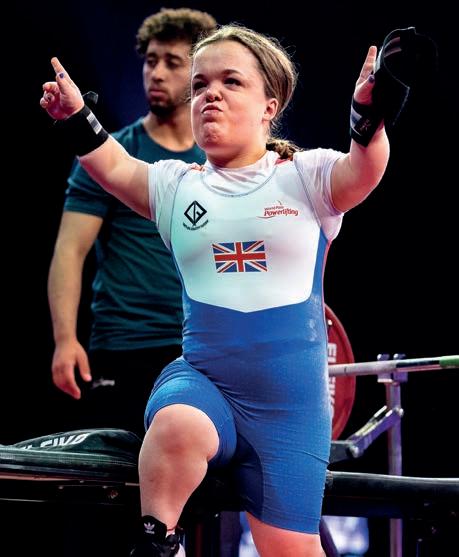
I attribute many of my achievements to the confidence I gained from my time studying at DLD College London. It inspires a culture of curiosity that has shaped my attitude and much of my academic and personal pursuits.
I’ll be graduating from the University of Exeter this year with a BSc in politics and management. My interest in politics flourished at DLD – I have fond memories of walking over Westminster Bridge with friends to catch PMQs, and of lively debate with tutors with front-line political experience.
Over the last two summers, I’ve interned at a consulting firm in Singapore and at one of Britain’s largest banks. I’ve travelled independently and extensively across East Asia, and now hold an offer to join a bulge bracket bank upon graduation. I’m looking forward to an exciting career in finance and feel incredibly grateful for the inspiring experiences I had at DLD, which helped shape my journey.
CEO & co-founder, Untap Health St Swithun’s School, Hampshire
After school, I pursued a BSc in physics, an MSc in petroleum geophysics, then a PhD in fatigue in aerospace engine alloys with Rolls-Royce. St Swithun’s taught me resilience and the importance of curiosity, both of which have been critical in my career. During my PhD, I developed a passion for industrial innovation, leading me to co-found Untap Health in 2021.
Untap Health focuses on early-stage illness detection through sewage surveillance, measuring viral and bacterial markers to monitor community health. The concept came during the pandemic. The company has received funding from prominent global VCs and tech industry leaders. We’re piloting our technology at several sites, with plans to expand soon.
I’ve also earned awards, including Woman in Innovation 2023 from UKRI and High Growth Woman Founder from UKBAA, which validate the importance of our work. My journey from aerospace to health tech has been full of exciting turns.




















Autumn fun, holiday inspiration and a chance to win a family getaway
With its origins in a long-distance friendship between Istanbul and Barcelona, Letter to the World is a sustainable children’s fashion line conceived by a stylish duo with a passion for creating clothes that are fun and comfortable for all youngsters, whatever their pursuits. The result? Playful prints, retro colour palettes and kooky slogans. wearelettertotheworld.com
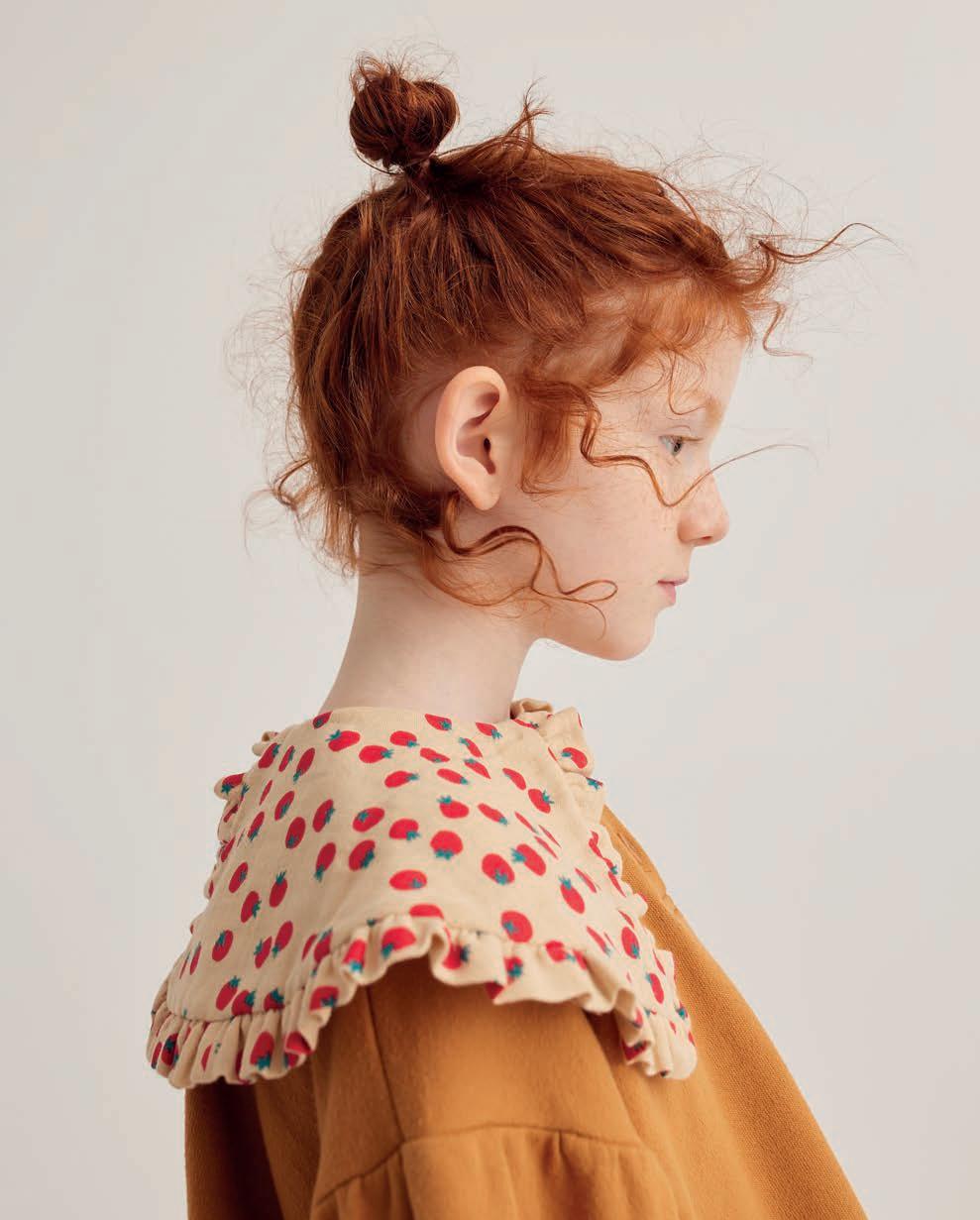
Tracey Davies and her three children enjoyed a whirlwind weekend filled with animals, adventure and autumnal splendour in the New Forest
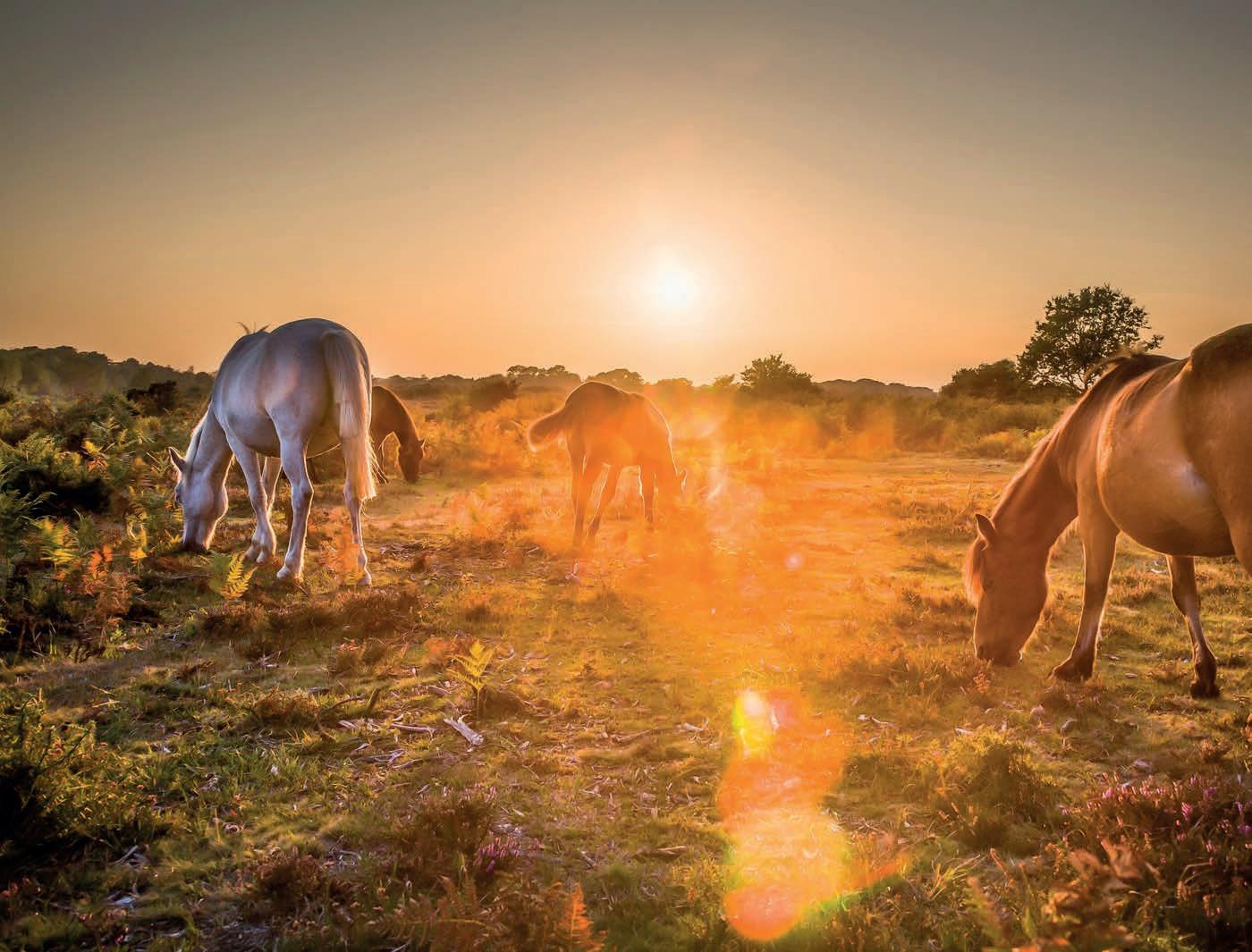
Ihear a rustle from the bushes. A shower of yellow gorse buds scatter to the ground and out pops a ra sh head with big hazel eyes, a treacle muzzle and a straw-like mane. The pony stares at us with a solemn eye, which melts into a flirty, come-hither look as we move closer. Squealing with delight, my 13-year old twin daughters, Nancy and Lola, reach out to stroke him. Unfazed by the attention, he allows the girls a quick ru e before snorting nonchalantly and tottering o into the bushes.
Once a royal hunting ground for deer and wild pigs, the New Forest is perfect for an autumn break. We’re staying in Brockenhurst, which along with Lyndhurst and Burley forms a golden triangle of New Forest villages. With its buntinglaced High Street, cutesy tea rooms and
traditional shops – the village butcher sells local grouse, while the grocers hide their veg boxes from snacking ponies –Brockenhurst hails from a di erent era.
As we drive through the forest – which in parts feels more Brontë’s Wuthering Heights than Blyton’s The Enchanted Wood – the twins are mesmerised by the wildlife which roam so freely. Fringing Hampshire to the east, Dorset to the west, and Wiltshire at its northernmost reaches, Britain’s smallest national park is home to thousands of wild ponies, cattle, deer and donkeys. During pannage in autumn, when local pigs are traditionally let loose to sna e up excess acorns, it’s like a rebellion from Old MacDonald’s farm.
“This is how I imagine Africa to look,” says my 16-year-old son, Angus, staring out at the vast undulating scrubland. “But instead of zebras and lions, there are, like, weird horned cows and little ponies, it’s really cool!” I can see what he means.



Much of the landscape is brush; scratchy heathland strewn with purple heather and ferocious gorse, but as we steer o the main drag, we discover fairytale woodland glades dappled in the early evening sun. The next morning we’re up with the

DURING PANNAGE IN AUTUMN, WHEN local pigs are traditionally let loose to snaffle up excess acorns, IT’S LIKE A REBELLION AT MACDONALD’S FARM


larks for a guided canoeing trip along the Beaulieu River. As we haul the brace of Canadian canoes down the slipway, our guide, Andy explains that this is the country’s only private tidal river and, like much of Beaulieu, is owned by the Montagu family.
The river is 12 miles long and the last four or so down to the Solent Estuary are tidal. Slicing our paddles through dark, murky waters we glide past moored sailing boats and colourful skiffs, navigating the buoys as we go. As a kingfisher surveys our progress from the river bank, Andy points out a copse of ancient oak trees which were deliberately warped over several generations for use in boatbuilding in nearby Buckler’s Hard shipyard.
Six miles east of Brockenhurst is Beaulieu. Founded in the 1200s by Cistercian monks from Beaulieu Abbey,

• See an 18th century shipbuilding village at Buckler’s Hard
• Go canoeing on the Beaulieu River
• Visit the National Motor Museum at Beaulieu
• Walk an alpaca through the forest
• See the otters at New Forest Wildlife Park
• Ride on a classic steam train at Exbury Gardens
• Hire an e-bike and go cycling through the forest
• Play on the aqua park at The New Forest Water Park, Fordingbridge
• Visit the Sammy Miller Motorcycle Museum in New Milton
• Ride the rollercoasters at Paultons Park



MUCH OF THE LANDSCAPE IS BRUSH; HEATHLAND strewn with heather and ferocious gorse, but as we steer off the main drag, we discover FAIRYTALE WOODLAND GLADES DAPPLED IN THE EARLY EVENING SUN
the name is derived from the Latin ‘bellus locas’, which means beautiful place. On the outskirts of the village is the National Motor Museum, another legacy of the Montagu family, which features iconic cars like Elvis Presley’s claret-and-silver Cadillac Seville and Del Boy’s yellow Reliant Regal van from Only Fools and Horses, and more recently, the crusty orange Piaggio Ape which stars in the Absolutely Fabulous movie.
Boundless adventure
One of the glories of a weekend in the New Forest is the rare opportunity to ditch the car and explore on two wheels. We hire bikes from New Forest Adventure in Beaulieu village and armed with a map of the area and a picnic the four of us cycle down to Buckler’s Hard, an 18th
century shipbuilding village-turned-living maritime museum. Built by the second Duke of Montagu, Buckler’s Hard was responsible for many British naval ships in the 18th and 19th centuries, including Nelson’s fleet – HMS Agamemnon, HMS Euryalus and HMS Swiftsure – which fought at the Battle of Trafalgar. On the ride back to Beaulieu we come across a tra c jam. “What’s holding everyone up?” asks Angus, as we join the queue of cars snaking back a mile or so. As we edge closer, he spots the troublemaker. A tawny brown cow, about the size of a Fiat 500, slowly leading the cars like some kind of bovine cortège. Proving that in this tiny corner of Hampshire, the cows, ponies and pigs are the rulers of the forest. thenewforest.co.uk
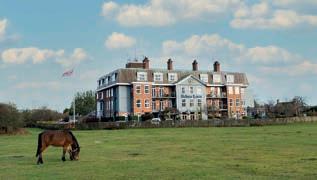
Moments from Brockenhurst in the heart of the national park is Balmer Lawn, an imposing 19th century hunting lodge turned cosy countryhouse hotel.
Family rooms start from £260, B&B. balmerlawnhotel.com





|





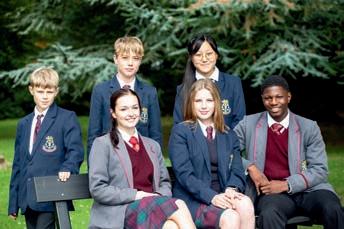
Outstanding facilities, an all-round education and endless opportunities await you at The Duke of York’s Royal Military School; students thrive and make outstanding progress academically. 85% of students achieved A* – C grades at A Level, and 95% of students progressed to university - 40% of which were Oxbridge and Russell Group. Students benefit from excellent teaching, a comprehensive curriculum, and a vast breadth of opportunities beyond the classroom. Our boarding school, open to 11-18-year-olds, offers highly competitive full, weekly and day boarding fees. We pride ourselves on offering outstanding pastoral care, ensuring students feel relaxed and happy in their home away from home.


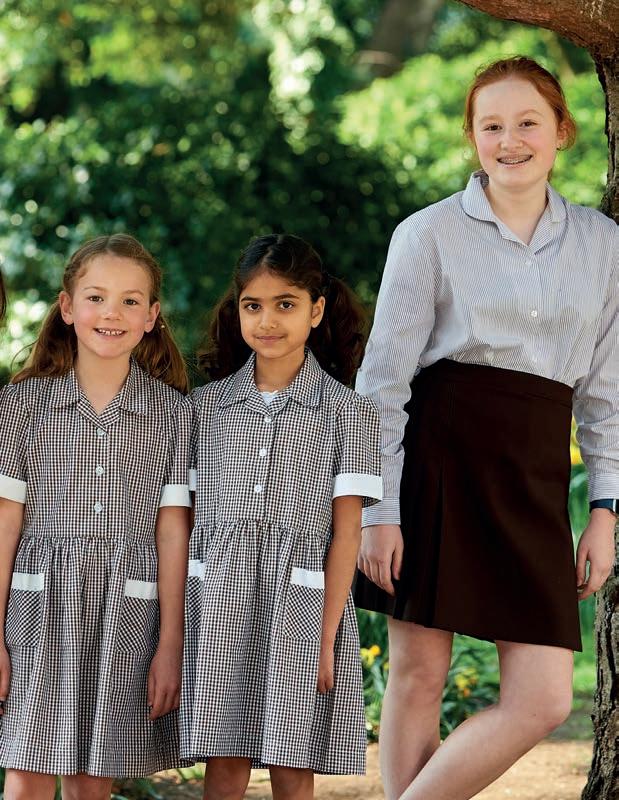

Our roundup of this winter’s fun and inspiring events, exhibitions, and activities

UNTIL 5 MAY 2025
Liverpool
Step inside the heart of the swarm at World Museum Liverpool over the coming months with its brand-new immersive exhibition dedicated to bees. Bees: A Story of Survival fuses art and science to highlight the plight of these fascinating little creatures – follow the sounds and scents through a wonderland of trees and digital wildflower meadows into the heart of a living colony that features the most incredible soundscape of more than 40,000 bees.
The exhibition imagines and dramatically highlights the devastating impact of a world without them – but ultimately presents a message of hope for the future and is a great way to encourage our children to love and respect bees a little more. The exhibition premieres at World Museum Liverpool, before embarking on a global tour from May 2025. Tickets are priced from £12. liverpoolmuseums.org.uk/bees
19-30 DECEMBER
London
Have you seen Swan Lake more times than you can possibly count? For two weeks only, Australian circus company Circa brings its own exuberant reimagining of the classic Christmas ballet to Royal Festival Hall with Duck Pond – a thrilling festive treat for all the family. Brimming with stunts, jaw-dropping aerials, and comedy, it’s a joyful and exhilarating tale of beautiful swans, a hapless prince and a rather cheeky flipper-wearing flock of ducks that’s not to be missed. Tickets from £20. duckpond.live


UNTIL 12 JANUARY 2025
London
Transport your family back to Victorian London this festive season with The Lost Estate’s immersive dining experience and retelling of Dickens’s A Christmas Carol. Bringing together some of the capital’s leading talents in theatre, music, mixology and fine-dining, the performance is accompanied throughout by cinematic live music and a carefully curated three-course Victorian feasting menu that’s been devised by executive chef Ashley Clarke, with vegan and vegetarian options available. The iconic experience, located in West Kensington, is a regular sellout – so don’t miss your chance to enjoy it this year. christmasfeast.thelostestate.com
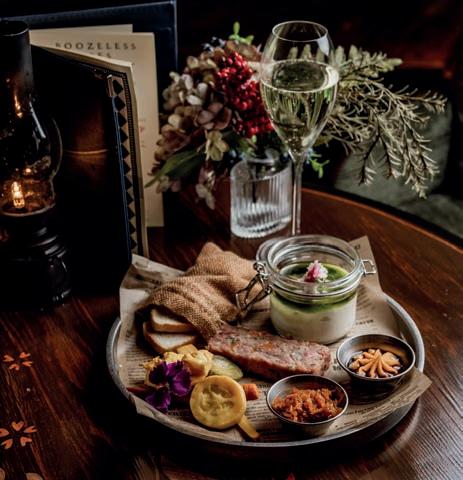
15 NOVEMBER – 5 JANUARY 2025
Hampshire
If you’re looking to enjoy the full festive experience over the holidays, Southampton is pulling out all the stops with its exciting programme of events taking place from November onwards. While the city centre will be transformed into a winter wonderland thanks to giant snow slides, festive light shows, pop-up bars and live music, you’ll also be able to shop local designer fares, quirky gifts, handmade Christmas decorations and generous helpings of food at the alpine-style Christmas market. If you fancy a spot of ice-skating, glide across the ice at Westquay with the pretty, historic city walls as your backdrop, or book tickets to catch the 30-piece swing orchestra on Sunday 22 December for a musical extravaganza like no other. visitsouthampton.co.uk/christmas

17 NOVEMBER, 15 DECEMBER & 19 JANUARY 2025
London
Could you have a mini master chef on your hands? Michelinstarred restaurant Pavyllon London – located at the Four Seasons Park Lane – has partnered with En Cuisine Cooking School, founded by Florence Rebattet, to launch a rather special culinary experience on the third Sunday of each month until January. Petit Pavyllon will see the youngsters getting to grips with a 90-minute cookery class (complete with chef’s hat, apron and dishes to take home, of course) while parents enjoy the restaurant’s popular four-course Lunch in 55 menu, with dishes from French chef Yannick Alléno. At the end of the class, your budding chef will proudly present their fine dining creations at the iconic Pavyllon counter. Bon Appetit! Suitable for children aged 6-12 years and start at 12pm and 1.30pm. The whole-family experience is priced from £350. pavyllonlondon.com/event/petit-pavyllon-cooking-school

FROM 8 NOVEMBER
Newcastle
Newcastle University’s Hatton Gallery and nearby Shipley Art Gallery are both home to a whole host of activity throughout November and December, from art workshops to exhibitions. Join the team at The Shipley Art Gallery for its monthly Saturday art classes for families with children aged seven to 12 to discover varying art techniques, such as watercolours, ceramics, drawing and more, or pop by Hatton Gallery to see the Mali Morris: Returning exhibition, the largest exhibition to date from the renowned British abstract painter. Morris is best known for her use of vibrant colour – and this incredible exhibition is sure to inspire any budding young creatives. hattongallery.org.uk/whats-on; shipleyartgallery.org.uk/ whats-on
8 NOVEMBER – 5 JANUARY 2025
London
If you find yourself in the heart of the capital this winter, be sure to check out the goings-on at the beautiful and historic Tower of London. Remembrance Day will be marked from 8-16 November with Poppy Fields at the Tower – an immersive sound and light experience where the walls both inside and out will be illuminated with historic photographs and artwork, accompanied by music and poetry readings, from the Tower of London during wartime. Visitors will also be granted special access to see the Crown Jewels after hours. Meanwhile, December sees the launch of some brandnew festive installations that will showcase the history of royal Christmas traditions, and younger guests will have the chance to meet the Tower Postman for a giant game of passthe-parcel, enjoy festive music and magical performances of A Visit from St Nicholas in partnership with History Riot. hrp.org.uk
14 NOVEMBER & 5 DECEMBER
Rotherham
Flux Rotherham – a local organisation that promotes free events in and around Rotherham, including festivals, dance experiences, art exhibitions and more – has launched its evening supper clubs in collaboration with Women of the World Foundation, designed to celebrate women, girls, trans and non-binary communities in the area. The WOW Rotherham supper clubs are a safe space for people to come together for discussion, workshops and excellent food cooked by a community chef. From 6pm on selected dates. Tickets must be booked in advance.
thewowfoundation.com
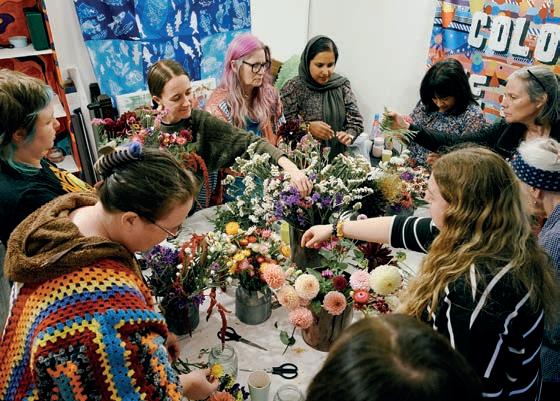
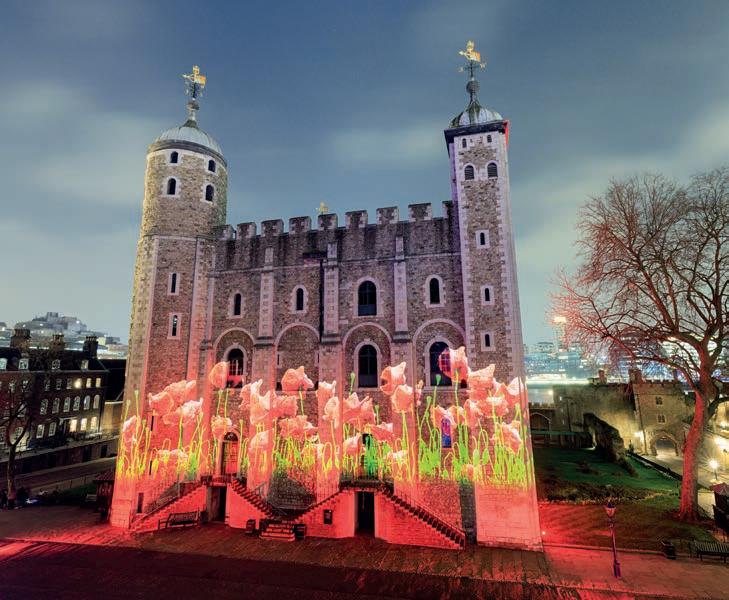

FROM 8 NOVEMBER
London
East End hotel Hart Shoreditch will be hosting a line-up of creative workshops this winter, hosted by local artists and entrepreneurs, designed to ignite imaginations and foster a sense of community in the capital. Guests can try their hand at everything from jewellery making to musical improvisation. Book in for the Christmas decoration mosaic workshop with local artist Natalie Kent on 30 November and spend three hours creating your very own unique and colourful pieces made from tiles as you enjoy drinks, nibbles and a generous dose of festive cheer. Further workshops will be taking place throughout December, tickets must be booked in advance. hartshoreditch.com
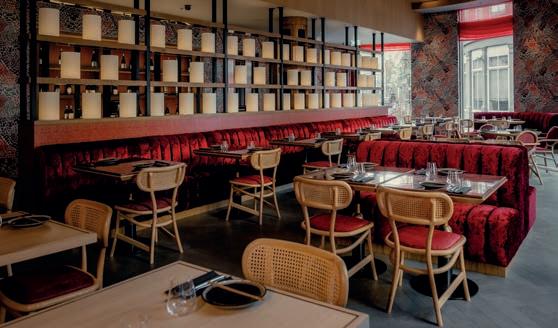
FROM 23 NOVEMBER
London
For Christmas events that you’ll want to add to the family calendar ASAP, the iconic Old Royal Naval College in Greenwich has plenty going on to entertain adults and children of all ages. From festive afternoon teas and dining opportunities in the breath-taking Painted Hall to carol concerts and storytelling from Father Christmas, there’s tons to see and do, with opportunities to shop for unique gifts in the annual pop-up market, too. Luke Jerram’s astonishing Mars installation in the Painted Hall is also well worth a visit for aspiring astronauts. Some events require tickets, so do pre-book to avoid any disappointment. ornc.org/whats-on
Nationwide
Author, actress and presenter Floella Benjamin’s important and much-loved autobiographical story Coming to England has now been adapted for the stage and has begun its UK-wide tour. Retelling the story of how Floella – who, despite being subjected to racism and adversity grew up to become Baroness Benjamin of Beckenham – moved from Trinidad in the 1960s with her siblings aged just 10 to join her parents in London, this vibrant and energetic show is filled with music, storytelling, and song. A tale of hope, determination, and triumph; we’re declaring it a must see. comingtoengland.com





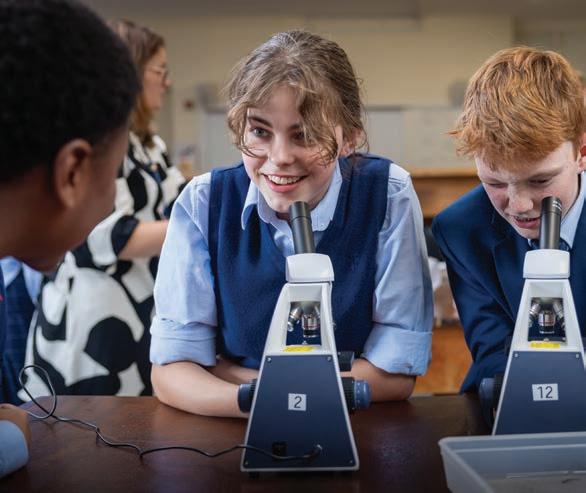



















































































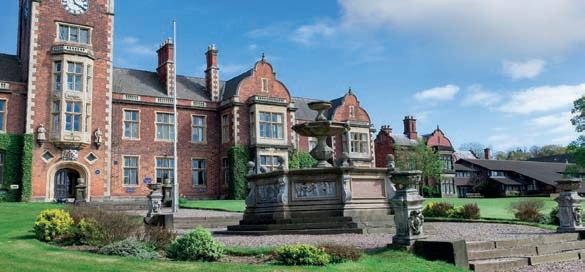














A weekend away awaits a family of four in the glorious Scottish county of Perthshire, full of wild adventure and deep relaxation at Loch Rannoch Hotel, Estate & Spa
Winter can be a truly magical period at Loch Rannoch Hotel, and it’s easy to relax with a ernoon tea or a dram in front of the roaring log res in the Drawing Room and the cosy Whisky Bar. Blow away seasonal cobwebs in the fresh Perthshire air with scenic walks, hiking and Munro climbing, cycling around the loch, or stay inside and splash around in the indoor swimming pool. Pamper yourself with an ESPA treatment and enjoy the spa’s steam room and sauna, or simply wind down and enjoy rst-class dining in the award-winning Estate Room restaurant or informal Wild Brownie bar. lochrannochhotel.com


• A two-night stay for two adults and two children on a B&B basis in a shared room.
• A bottle of prosecco upon arrival.
• 2 x 30 min treatments.
TERMS & CONDITIONS:
• Black-out dates include bank holidays (Friday-Monday), 24-27/12, 31/12/2024-02/01/2025 and depend upon availability.
• Validity: available for bookings until the end of April 2025.
Please answer the following question and enter at the website address below: What is the name of the informal bar at Loch Rannoch Hotel? a) Wild Scout b) Wild Girl Guide c) Wild Brownie
CLOSING DATE: 8 DECEMBER 2024
The West-End star tells us all about the happy years he spent at Hurtwood House in Surrey
Your school in three words
Exciting, supportive, fun.
Who was your best friend?
Harvey Wright. He’s a talented writer and put on lots of plays at school. I performed in one we took up to the Edinburgh Fringe, and I subsequently starred in his first film, Sticky To ee Pudding
What did you want to be when you grew up?
An actor.
Most embarrassing moment?
During a performance of the musical Rent. I was playing Roger and as I stood on the table to play my guitar solo, I missed my footing. The table wobbled and I very nearly fell o in front of an audience of a couple of hundred people.
Play any pranks?
I was pretty well-behaved.
Let’s talk about the food... The food was absolutely top notch and there were so many di erent options to choose from. The wood-fired pizzas were amazing and I adored the barbecues. I went back to Hurtwood House recently to help some current drama students and the food seemed to be even better than I’d remembered.
Favourite place at school to hang out with friends?
My favourite place to hang out was on the theatre lawn because the view of the Surrey Hills was unforgettable.

show on for 10 nights and at that moment I realised that I was going to have the most incredible two years of my life.
Favourite teacher?
Nicki, my English teacher. At my previous school, I was used to teachers being really strict and shouting at us. Nicki was so inspirational and supportive that we all worked hard because we didn’t want to let her down.
What advice would you o er your school-age self?
Relax and try to enjoy every moment. I was sometimes worried about trying to get into drama school. I was lucky to get into GSA (Guildford


Teacher’s pet or always in the detention room?
I wouldn’t say I was a teacher’s pet, but I never did detention. I worked hard and I took every opportunity going. I was in so many productions that I had to get my work done, so I didn’t have time for detention.
Lone wolf or a team player?
Definitely a team player, as I enjoyed both theatre and sports. I was captain of Hurtwood’s football team and the moment the match ended, I’d have to sprint o to be part of the theatre production.
I’M SO GRATEFUL FOR WHAT Hurtwood House did for me that I try to give something back to the school by RETURNING EACH YEAR TO HELP
Star of the show or working hard behind the scenes?
I was lucky enough to be the star of the show. There were so many shows at Hurtwood House too. As well as the lead in Rent, I was Danny in Hurtwood’s Grease, sang in numerous pop concerts and starred in numerous films that other students were making for media studies.
Most memorable moment? Listening to the applause for our first performance of Grease at school. I knew we were about to put the
School of Acting), but now I realise that there are many di erent routes to what I was hoping to do and getting stressed wouldn’t have helped my chances anyway.
How would your teachers have described you?
Probably as outgoing and focused – and hopefully kind. I’m so grateful for what Hurtwood House did for me that I try to give something back to the school by returning each year to help students with their dramaschool auditions.








